#volatility patterns
Explore tagged Tumblr posts
Text
Learn How To Analyse Volatility Patterns With The Keltner Channel

We will introduce the concept of the Keltner Channel Indicator, explaining how this unique tool is constructed using a combination of moving averages and an average true range (ATR) calculation.
0 notes
Text
Technical Analysis in a Nutshell
Technical analysis is a method used to evaluate and forecast the price movements of financial instruments, such as stocks, commodities, and currencies, by analyzing historical price data and trading volumes. Unlike fundamental analysis, which focuses on a company’s financial health, technical analysis relies on patterns, trends, and statistical indicators to make trading decisions. This article…
#Bollinger Bands#Chart Patterns#Divergence#Entry and Exit Points#Exponential Moving Average#Financial Markets#Fundamental Analysis#MACD#Market Movements#Moving Average#Moving Average Convergence Divergence#Oversold Conditions#Position Sizing#Price Charts#Price Movement#Price Movements#Relative Strength#Risk Management#RSI#Security#Stop-Loss#Support And Resistance#Technical Analysis#Trading Decisions#Trading Strategies#Trading Volume#Trend Lines#Volatility
2 notes
·
View notes
Text
Mukka Proteins Acquires 51% Stake in GSM Marine Export for ₹14 Crore
Mukka Proteins Limited has announced the successful acquisition of a 51% stake in GSM Marine Export, a partnership firm engaged in the manufacturing of fish meal and fish oil. The acquisition, finalized through capital contribution for a consideration not exceeding ₹14 crore, is in line with the company’s strategic vision to strengthen its core business operations. In its regulatory filing under…

View On WordPress
#MUKKA 52-week high#MUKKA 52-week low#MUKKA EPS#MUKKA NSE#MUKKA P/E ratio#MUKKA price to book ratio#Mukka Proteins dividend yield#Mukka Proteins financials#Mukka Proteins investment analysis#Mukka Proteins Ltd financial ratios#Mukka Proteins Ltd IPO review#Mukka Proteins Ltd share price#Mukka Proteins Ltd stock news#Mukka Proteins market cap#Mukka Proteins quarterly results#Mukka Proteins share#Mukka Proteins share performance#Mukka Proteins shareholding pattern#Mukka Proteins stock analysis#MUKKA stock chart#MUKKA stock forecast#MUKKA stock price#MUKKA stock review#MUKKA stock trading volume#MUKKA stock volatility
0 notes
Text
me explaining how king man and betty would probably end up a bit like mr peanutbutter and diane if they continued to stay together on mars instead of just working my damn fanfictioj about it

#💬#cartoons#adventure time#i've become so invested in this take#betty's declining mental health and frustration with her situation#and determined/outspoken personality who's so insistent on what she's doing being The Right Thing#who as such a big catalyst also makes incredibly rash decisions that end up making everything so much worse#and normal king man on that e2+7 bad at listening toxic positivity train with occasional douchebag qualities#and avoidance strats to avoid falling into despair despite meaning well!!!#👏👏👏#i do think king man is less oblivious than mr. peanutbutter though so i don't think it'd end up as volatile#he's just keen on Fixing things he's messed up and that includes betty#as well as still not coping properly so i can imagine betty still not always feeling heard#even though they literally have the capacity to connect so much#he's also very prone to old patterns i feel like#and betty is like that era of resigned ''we can make it work out'' diane who's simutanously getting fucked up and crashing at bojack's#her roping king man in last minute to try to awaken GOLB despite what kind of consequences it would have#and not actually having king man's best interests in mind because the bigger picture is more important feels so diane-core tbh#i really do need to get more invested in diane/mr. peanutbutter they're such a disaster#do you get it though... do you see my vision.........
6 notes
·
View notes
Text
Binance Exclusive: Start Trading with $100 for Free!

Take your first steps into the exciting realm of cryptocurrency trading with Binance! Sign up now and receive a complimentary $100 to kickstart your trading journey. Explore a diverse selection of cryptocurrencies, hone your trading skills, and potentially turn that initial $100 into something more. Don't miss this exclusive offer – seize the opportunity to trade on Binance with free funds! #binance #cryptotrading #freemoney Link Below : https://bit.ly/BinanceFree100
#Cryptocurrency#Forex#Stocks#Day Trading#Swing Trading#Technical Analysis#Fundamental Analysis#Trading Strategies#Risk Management#Options Trading#Futures Trading#Bull Market#Bear Market#Market Trends#Stop-Loss#Take Profit#Margin Trading#Leverage#Candlestick Patterns#Market Volatility
0 notes
Text
I think I need a tag… for my running pear commentary, but I finally came across some beautiful red pears, and they give off a tantalizing fragrance reminiscent of red wine…
#if I had the money I’d literally switch gears and study botany with a focus on aromatic compounds#would be interesting to see if there’s a consistent pattern with specific phytopigments and volatile compounds
1 note
·
View note
Text
🎨Blind date with your ex-husband. You never expected it to be… Rafayel.
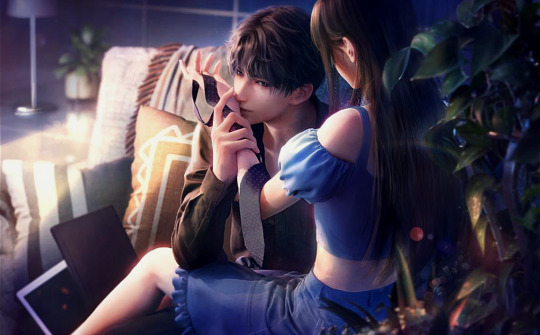
Inspiration hit me going 100mph down the highway, and I took an unscheduled gas station stop just to write this down. My husband almost divorced me again thinking I’d lost my mind — so in a way, this series is dedicated to him. And to second chances. I know they exist. I’ve lived one. 🥀
An unplanned new series. Five ex-husbands. Same setup, different reactions.
❄️ Zayne | 🏍 Sylus | ✨Xavier | 🍎 Caleb

CW/TW: Divorce / Post-divorce emotional trauma, Toxic romantic cycles, Verbal conflict / emotional manipulation, High emotional volatility, Crying / vulnerability, Jealousy, Theatrical intensity, Implied sexual content (consensual, emotionally charged), References to artistic obsession, Codependency themes.
Pairing: Rafayel x ex-wife!you Genre: Operatic angst, sensory overload, intimacy tangled in art and argument. Enemies to lovers to something mythic and broken. Summary: Rafayel was always too much — too vivid, too loud, too in love with the idea of being in love. Now, in a room made of silk and memory, you’re forced to confront the passion that nearly devoured you both. What begins with masks ends in scorched truths, spilled wine, and a kiss that remembers every wound it ever caused. Word Count: 3.6K
The room was a mirage made of silk.
Blue and amber fabrics swayed gently overhead, catching the glow of hanging lanterns that burned like slow, ancient stars. Patterns scattered across the floor like constellations, stitched from shadow and gold. The air pulsed with warmth, scented with saffron, cardamom, rosewater, and smoke — something too heady to be real.
A low table stood in the center, set for two. Carved brass, aged like a secret. Cushions instead of chairs. A bowl of candied figs. Crystal glasses half-filled with something rich and ambered, already beading condensation in the heat.
The music played softly, something stringed and spiraling, full of bends and minor keys. It didn’t fill the space — it wrapped it. Like a whisper over skin.
You sat with your hands folded in your lap, heart steady, but only just. Something about the room felt dangerous. Not overtly. But the kind of danger that came wrapped in silk and compliments. The kind you didn’t notice until it was inside you, changing your breath.
Then the curtain stirred.
A figure stepped through the veil — tall, lithe, draped in pale fabrics that shimmered like wet paint. A mask covered the upper half of his face: smooth silver, delicate scrollwork, slightly fox-shaped. His hair was dark — maybe lavender? — but the lighting played tricks, casting halos where none should exist.
He moved with a liquid elegance that set your nerves on edge. Not performance. Presence.
And something in your chest twitched.
He sat across from you without hesitation, folding into the cushions like the air had made room for him. One ringed hand toyed with the stem of his glass. He hadn’t looked at you fully yet, but even the curve of his jaw behind the mask felt… familiar in a way you didn’t want to name.
You watched him watching the room.
The shape of his throat. The line of his wrists. The quiet, performative grace of someone used to being looked at — and loving it.
Your stomach turned, slowly.
Then he looked at you. Just briefly.
And smiled.
The candlelight caught in his eyes — unnaturally pale, a hue caught somewhere between rose and seafoam. Impossible. Stunning.
Your pulse skipped. Once. Hard.
No.
No, no, no—
Too dark. Too hazy. Too many fragrances in the air. That’s all this was. A trick of the senses. A trick of memory.
And then—
He spoke.
“Let me guess,” he said, voice smooth as velvet over glass, warm and slow and theatrical. “You’re the one they warned me about.”
Your throat tightened.
No name. No gesture. But your skin recoiled like it had just touched flame.
You made yourself breathe. Spoke without thinking. “Depends. What was the warning?”
He tilted his head slightly, like he’d heard something inside your voice that he didn’t expect.
“That I’d end the evening ruined.”
Your fingers curled in your lap.
That voice. You hadn’t heard it in almost a year. But your bones remembered.
Still — you didn’t move. You didn’t give him the satisfaction of recognition.
He poured the drink anyway. Fluid, slow, luxurious. Passed the glass across the table with the same fingers that once traced poems into your shoulder blades at dawn.
No. Don’t go there.
“Drink,” he said, watching you now. “It makes the disappointment more beautiful.”
The room shifted with the sound of his voice, like the silk overhead had caught its breath. One of the lanterns flickered. The scent of rose and something darker curled tighter around your ankles.
You didn’t touch your glass.
“Disappointment implies expectation,” you said. “You always did mistake fantasy for reality.”
He smiled — sharp and amused, like you’d stepped into a trap he’d laid years ago. “Still fluent in cruelty, I see. Good. I was afraid domesticity might’ve tamed you.”
You reached for the glass then, just to keep your hand busy. “And I see you’re still confusing cleverness with depth.”
The flicker in his eyes was almost too fast to catch.
You took a sip. The drink was sharp, floral, and laced with something decadent.
He was watching you. Not politely. Not appreciatively. Like a man trying to decide whether to paint you or burn the memory of you from his mind entirely.
“I should’ve known it was you,” you said finally, setting the glass down with a deliberate clink. “All this silk and smoke? Feels like the opening act of one of your breakdowns.”
He smirked. “Then you should’ve checked under the cushions for a script.” A beat. “Though if anyone here’s performing,” he added, “it’s not me this time.”
That got a laugh out of you. Low, involuntary. Dangerous.
“God,” you said. “You’re exhausting.”
He lifted his glass again, gaze steady over the rim.
“And yet someone out there thought we’d make a charming pair.”
A pause.
“Statistically improbable,” he added. “But then again, so were we.”
The silk walls shifted faintly in the breeze of the central fan, as if the whole room leaned in.
You tilted your head. “They said this was a blind date. I didn’t realize they meant blind in the Biblical sense.”
“Ah.” He leaned back. “There’s the sermon I missed. Tell me, do you rehearse those in the mirror, or do they just fall out of you naturally?”
“You want natural?” you asked, voice cool. “Then take off the mask.”
He didn’t move. So you did it first.
The mask slid away with a soft hiss of fabric. You held his gaze, daring him to flinch, to breathe, to blink.
He didn’t.
Instead, after a beat, he reached up and peeled his own mask off — slow, like undressing a wound.
And there he was.
Exactly as you’d known he’d be. Beautiful in that way that always made you want to hurt something. Or kiss him just to feel how much it would cost.
His expression flickered when he saw your face.
“I thought you’d look different,” he said.
“I thought you’d grow up.”
That wiped the smirk right off his mouth.
For half a second, he looked like the boy who’d once painted your collarbone in gold leaf just because he could.
Then it was gone.
“You know,” he said, gaze dropping to your mouth, “for someone who always wanted peace, you start fights like it’s foreplay.”
You leaned forward slightly. “And for someone who always wanted to be adored, you sure made yourself easy to leave.”
Rafayel’s smile didn’t falter. But it sharpened — fractionally. Like the curve of a blade when it catches the light.
“Maybe,” he said softly, “I didn’t want you to stay.”
The words landed like silk draped over broken glass.
You blinked once. Then twice. Then let out a low breath of laughter — measured, dangerous, devastating.
“Oh, darling,” you said, tilting your head, “you always were such a convincing actor. Shame the role of coward never quite won you any standing ovations.”
He chuckled. “Coward?” he echoed, voice rich with amusement. “From you, that’s practically a love letter.”
You leaned back slightly, the candlelight catching the glint in your eyes.
“No, love letters require vulnerability. You wouldn’t recognize one if it was monogrammed and hand-delivered on rose petals.”
He lifted his glass in a mock-toast, eyes never leaving yours. “To you. The only woman who ever left a man mid-soliloquy and still expected an encore.”
You clinked your own glass to his with a smile that could’ve slit a throat. “To you. The man who wrote odes to my shadow but never once looked me in the eye long enough to know my shape.”
He laughed. You hated how beautiful the sound still was.
There was a pause, charged and theatrical, like the air had leaned forward on cue.
“And yet,” he said, swirling the drink in his glass, “you sat across from me. Masked. Unapologetically luminous. Like a challenge waiting to happen.”
“I was aiming for quiet mystery,” you replied, raising your glass. “But I suppose provocation always did look better on me.”
He leaned forward, close enough now for the scent of rose to cling between you.
“Then let’s drink,” he said, “to what we ruined so beautifully.”
You raised your glass. He raised his. Both smiles intact.
“To mistakes,” you said.
“To masterpieces,” he replied, then added, with a flick of his lashes, “—that deserved better muses.”
And that was it. Your hand moved before you thought.
You didn’t throw the wine.
You grabbed the wrong glass — the other one — and without hesitation, flung the contents at him.
It was tea. Very hot tea.
There was a stunned half-second as the amber liquid splashed across the front of his perfect, pale shirt — followed by a sharp inhale through his teeth.
He hissed softly, setting the glass down with a slow, deliberate clink. Then — without hesitation — he pulled the shirt over his head.
The fabric stuck to him slightly, steam curling off his chest like the room itself was reacting. His skin caught the lantern-light like marble dusted in firelight — golden, sharp-lined, impossible.
You stared.
Unfortunately.
He ran a hand through his damp hair, exhaling. “Always dramatic, aren’t you?”
“You deserved it,” you snapped. “And more.”
“More?” He stepped closer. “You always did like escalation. Tell me — should I throw a fig at your face? Or set something expensive on fire?”
You crossed your arms, not trusting your breath. “You’d enjoy that too much.”
“Because it’s the only language you speak!” he shot back. “Break it. Burn it. Drown it. But for God’s sake, don’t sit still and talk like a human being.”
You laughed, bitter and breathless. “That’s rich. Coming from you.”
He gestured wildly. “I begged you to stay! I begged you with everything but the word!”
“That was the problem,” you said, eyes burning now. “You gave me poetry when I needed something real. Something steady. Not ten thousand metaphors and a gallery of regrets.”
His jaw clenched.
“And now,” you said, voice cracking just enough to give it teeth, “you say I wasn’t enough of a muse. Well—”
You stood suddenly, movement sharp, breath shaking as your body tried to hold the rest in.
“—maybe you should’ve picked a prettier tragedy.”
You turned away, shoulders tight and trembling.
He froze.
Your back was to him now, and thank God, because your throat was tight, and your hands were shaking and that single line — that stupid, perfect insult about your worth — cut deeper than it should have.
You felt it first. His presence.
Then the heat of him, close, pressing in without touching.
And then — his arms wrapped around you from behind. One quick, quiet motion. Not forceful. Desperate.
He pulled you against him, bare skin warm and still faintly damp from the tea.
His nose buried in your hair. His breath unsteady.
“I didn’t mean it,” he whispered.
Your breath caught.
“I didn’t mean it,” he repeated.“God, I didn’t— You know I say things when I’m scared. And you looked like you were about to walk away all over again.”
You didn’t answer.
So he tightened his hold.
“I’m sorry,” he said, softer now. “I’m sorry I made you think you weren’t everything. I’m sorry I hurt you to feel less hurt myself. I’m sorry I used my mouth to ruin what it was made to worship.”
You closed your eyes.
His voice cracked on the last word.
“I never wanted anyone better,” he whispered. “I only ever wanted more time with you.”
You turned in his arms with a suddenness that surprised even you.
You meant to push him away. You meant to say don’t, to reclaim your anger before it crumbled. But your hands — traitors — only reached his chest and stayed there, limp. Useless. Pressed against his bare skin like they belonged.
He covered them with his own.
Not roughly. Not to keep you there. But to hold the contact steady — as if you might dissolve if he let go.
The heat of him burned through your palms. Steady. Alive. Too much.
You wanted to scream. You wanted to fold into him and scream into his collarbone.
Instead, you whispered, “How did we get here?”
His breath hitched.
“I loved you,” you said. “You loved me. And somehow we became this—” your voice broke, “—this shipwreck of a marriage. What happened to us, Raf?”
He didn’t answer right away.
So you filled the silence with everything your mouth had been holding for too long.
“It used to be magic,” you said, eyes wet now, but you wouldn’t let them fall. “God, we were light. We were gold. You made me feel like I was flying. And then one day, it was like we couldn’t breathe unless we were screaming.”
He said your name. Just once.
Low. Like an apology wrapped in prayer.
You kept going.
“Why did it turn into a stage? When did our home become a theater and our life some broken play where we both forgot our lines? I didn’t want to be a performance, Raf. I wanted to be real.”
He slid one hand up your back, slow, careful. As if you might break from anything more sudden.
“I know,” he murmured. “I know.”
“I didn’t recognize us anymore,” you said, the words trembling. “All we did was throw paint. Emotions. Blame. Color, color, color, until we drowned in it. Until we forgot what normal even meant.”
He leaned his forehead to yours, his breath catching against your cheek. And when he spoke, his voice had changed. Quieter. Lower. Without the velvet and dramatics. Just him.
“I was scared,” he said.
You blinked.
“I was scared,” he repeated. “That if things slowed down — if we got too quiet, too normal — you’d leave. That you’d realize I wasn’t enough without the chaos. Without the fire.”
You stared at him. Your hands still pressed to his chest. You could feel the way his heartbeat stumbled.
“So I gave you fire,” he said. “I gave you storms. I made our life… louder, because silence felt like death.”
“And I left anyway,” you said.
“Because I set the house on fire and expected you to dance in it.”
You closed your eyes. His words were knives. But so was your silence.
“There was jealousy,” you murmured. “And guilt. And all your little accusations when I was too tired to match your flame.”
He swallowed hard.
“You were angry when I fell asleep during your gallery story,” you added. “But I’d just come home from a mission. I’d spent five hours knee-deep in wanderers and blood and—” you exhaled, “—I needed sleep, Raf. Not a performance.”
He didn’t interrupt.
“I needed rest,” you said. “And all I got was another curtain call.”
He looked ruined. Not fragile. Not shattered. Just exhausted from pretending not to be.
“I was so afraid of losing you,” he said. “So I smothered you with everything I thought would make you stay.”
You looked at him — really looked — and something inside you cracked down the center.
And still, part of you whispered: It might not be enough.
Rafayel tensed — just a little. The shift of a shoulder, the pause in his fingers at your back.
“Did you come here,” he asked, voice low and almost too careful, “because you’re ready to move on?”
You smiled, slow and sly. Not to tease, but to veil the flicker of something softer.
“Maybe my life’s been too normal lately. Too gray.” You leaned the smallest bit closer, letting your cheek rest against his bare chest. “I needed a little danger again. And you?”
His heart responded beneath your skin.
He chuckled, brushing his knuckles lightly down your spine. “I could say I was looking for an exotic muse to paint. Something with cheekbones sharp enough to draw blood and an aura of doomed seduction.”
You huffed a laugh against his skin. “That would’ve been a very you thing to say.”
“But the truth,” he murmured, “is boring. Thomas set me up. Said he registered, got sick, and that some poor woman would be stuck alone unless I stepped in. He was very dramatic about it.”
You tilted your head back to look at him, eyes narrowing. “Tara pulled the same trick on me.”
“Ah.” His lips quirked. “Coordinated sabotage. Typical.”
A moment passed, heavy in the hush. You hadn’t meant to relax like this, but here you were — cheek to his chest, listening to the rhythm of a heart that had once been your home. And still was, apparently. Because everything inside you had gone soft, slow, steady.
It felt like something had clicked back into place. Like a missing tile in a mosaic suddenly slotted home and made the whole thing whole again.
Your voice, when it came, was quieter. Uncertain. Honest.
“Raf… why did you sign the divorce papers?”
He didn’t answer at first. His fingers moved gently through your hair, brushing behind your ear. When he finally spoke, his voice had dropped into something rawer.
“Because I respect your decisions. Even when I didn’t agree with them.”
You looked up, eyes burning.
“I wanted you to be happy,” he continued. “Even if it meant watching you bloom from the sidelines. Watching you learn how to smile again without me in the frame.” He swallowed. “Are you happy?”
You hesitated. But the answer was already rising, uninvited.
“No,” you said. “The world turned grayscale. It’s like I’m walking through some awful dystopia with clean counters and dry eyes. Everything works. Nothing shines.”
He exhaled, long and low. His arms tightened around you, fingers threading into your hair, grounding you in scent and heat and skin.
“Cutie,” he murmured, voice close, mouth brushing your temple, “just say the word. I’ll paint the colors back in.”
“I’m afraid,” you admitted. “Still. Afraid to go blind from too much kaleidoscope.”
“I won’t lie,” he whispered. “I can’t promise restraint. I might always be a little too loud. A little too much. But I can give you something else now. Balance. Space. Stability. Peace, if you’ll have it.”
You searched his eyes.
He added, “Only if you’re ready. If you want to let me back in.”
“I never really closed the door,” you said. “Just stood behind it. Waiting.”
And that broke whatever spell held you still.
He kissed you.
Not hurried, not frantic — just whole. His mouth claimed yours like it had a right to, but still asked permission with every slow pull of lips, every breath passed between you.
You pressed into him, fingers curling at the base of his neck. His hand splayed across your lower back, warm and deliberate, guiding without demand.
He leaned into the cushions with you, dragging you down into silk and shadow, his mouth never leaving yours.
The taste of saffron and heat and memory filled you.
He kissed you the way people wrote arias — rising, falling, trembling with feeling too big for language. His tongue brushed yours gently at first, then deeper, hungrier, as if your mouth were the only place he could breathe.
You moaned softly against him, and he swallowed the sound, pulling you closer. Your legs tangled. His hand slipped beneath the hem of your dress, fingers grazing your thigh with aching reverence.
You moved like tide against him — hungry and fluid.
The lanterns swayed above. The cushions sighed beneath you. One of the glasses tipped over with a soft thud, spilling rose-colored wine that neither of you noticed.
His lips trailed down your jaw, to your throat, where he lingered, breathing you in like incense.
“You still taste like paradise,” he whispered.
And when he looked up again, your hair tangled in his fingers, your body flushed and pliant against his — you knew.
There was nothing gray left between you.
Only color. Only fire. Only Rafayel.
Your body answered his touch like it had been waiting a lifetime. Hot, eager, instinctive. Every stroke of his fingers sent sparks down your spine. Every kiss — soft or sharp — undid you a little more.
The silk beneath you could’ve caught fire from the heat you were building between each other.
His hands roamed without hesitation, without apology — palming, stroking, gripping — sometimes tender, sometimes greedy. Your back arched into him, chasing the sensations, chasing the memory of what it felt like to simply be wanted like this. Loved like this. By him.
His mouth found your throat. Then lower. His tongue trailed over skin like it was sacred. When his lips closed around your nipple, firm and aching, you whimpered — low and breathless — and pulled him closer, nails raking his back.
He groaned into your skin, and you swore your entire body melted into flame.
You didn’t want to stop. You didn’t want him to stop.
But then—
A soft, mechanical chime broke through the haze. Gentle. Too real.
The signal. The end of the hour.
You froze. So did he. Still hovering over you, still half-undressed, still hard and pulsing between your thighs.
You looked up at him, breathless.
He was watching you like the world might end if you looked away first.
“Do you regret it?” he asked, voice roughened by want.
You shook your head, smiling softly despite the ache in your chest. “No. Do you?”
His mouth quirked — cocky, fond, feral.
“Do you even have to ask?” he murmured, then rocked his hips forward just enough for you to feel the full weight of him, hard and ready. “Does that feel like regret to you?”
Your breath caught.
“I could steal you for the rest of the night,” he whispered, voice low and wicked, like a shared sin.
You grinned up at him, hand sliding into his hair. “You could steal me for the rest of my life.”
He growled — quiet and deep in his chest.
“We’ll see what you say tomorrow morning,” he muttered, brushing his lips along your jaw, “when you can’t walk straight or remember how to say no.”
You bit his bottom lip, teasing.
“Do you even know what moderation is?”
His eyes darkened with something hungry, reverent, unstoppable.
“Only in everything except how much I love you.”
And this time — when he kissed you — it wasn’t a performance. It wasn’t memory. It was home.
#love and deepspace#lads#xavier love and deepspace#zayne love and deepspace#rafayel love and deepspace#sylus love and deepspace#caleb love and deepspace#sylus lads#lads caleb#lads zayne#lads rafayel#lads xavier#xavier x reader#zayne x reader#rafayel x reader#sylus x reader#caleb x reader#caleb x mc#zayne x mc#rafayel x mc#sylus and mc#caleb x you#xavier x you#zayne x you#rafayel x you#sylus x you#storytelling#fanfic#fanfiction
686 notes
·
View notes
Text

Sigma Nu's Sweetheart
summary: A diamond in a house full of snakes. characters: frat boy! mattheo. frat sweetheart! reader. frat boy! slytherins warnings: mentions of alcohol and making pledges do things (not hazing) word count: 2.3k
They called it the Snake House, though its real name-Sigma Nu-was etched in fading silver above the wrought iron gates that led to the manor. Hidden behind ivy-draped columns and shrouded by ancient oaks, the fraternity estate stood on the edge of campus like a secret too dangerous to be kept in daylight. No one quite remembered when Sigma Nu had been founded-some whispered it was pre-dating the university itself, rooted in ancient rites and blood oaths sworn beneath crescent moons. But in the present, it was feared, admired, and envied in equal measure.
The president of Sigma Nu was Mattheo Riddle, a name spoken with the kind of reverence reserved for legends and tyrants. Sharp of tongue and sharper of mind, Mattheo ruled the fraternity not with brutish dominance, but with a silken charisma that wrapped itself around you like a noose. He was all marble and firelight: smooth, cold, untouchable on the outside, yet flickering with something volatile beneath the surface.
His second-in-command, Theodore Nott, was the shadow behind the throne. Where Mattheo set the tone, Theo enforced it. He was quieter, more calculated, with a gaze like cut glass and a voice you only heard when he needed to remind someone of their place. The brothers called him “The Watcher”-not because he hovered, but because he saw everything.
The rest of the inner circle rotated like planets in their orbit.
Lorenzo Berkshire, with his floppy brown hair and wicked grin, handled social affairs-if such a title could be applied to the lavish masquerades and forbidden midnight galas he orchestrated. Enzo was charm incarnate, hiding razor-sharp instincts behind a glass of wine and a well-tailored coat. People underestimated him. That was their first mistake.
Draco Malfoy, heir to a crumbling aristocracy, served as treasurer. But that role was a formality. Draco was the gatekeeper to the legacy. His family had once poured obscene amounts of money into Sigma Nu, and though the vaults ran thinner now, his word still carried the weight of dynasties. Cold and calculating, Draco rarely spoke unless it was to remind others they weren’t worth speaking to.
Then there was Blaise Zabini, the strategist. He didn’t run the meetings or throw the parties. He played the long game-the one that was always three moves ahead. A cigarette always rested between his fingers, and secrets curled around him like smoke. Blaise’s role wasn’t official. It didn’t have to be. In Sigma Nu, knowledge was currency, and he was the quiet king of the underground economy.
Together, they formed the serpent’s head.
The house itself was a relic from another time. Stained-glass windows filtered the sunlight into eerie patterns on mahogany floors. The walls were lined with portraits of brothers past-men with hollow eyes and stories that had been scrubbed from official records. A grand staircase, rumored to creak only when someone lied in its presence, split the mansion in two. The basement was off-limits, except for the highest-ranking members. What happened down there was never spoken of, but the muffled echoes that sometimes rose through the vents kept the rumors alive.
Rituals were everything in Sigma Nu. Pledging wasn't just about endurance-it was a test of will, of loyalty, of how far you were willing to crawl for power. And once you were in, you were in. There was no leaving. Not really. Former brothers found themselves mysteriously blacklisted, their futures erased with quiet efficiency. No one crossed the Snake House without bleeding for it.
Yet every year, the line to rush snaked down the cobblestone path, filled with students desperate to touch even the hem of that forbidden tapestry. Power, after all, is seductive. And Mattheo Riddle’s Sigma Nu had power in spades.
But inside those ivy-covered walls, something was shifting. There were murmurs of a fracture in the hierarchy. An outsider watching too closely. A secret the founders had buried that might be clawing its way back to the surface.
And at the center of it all: Mattheo, with a hand on the throne and another on the throttle.
But between the echoes of old secrets and the weight of a legacy stitched in silence, she was the unexpected constant-soft in a world that was anything but. While Mattheo navigated the shifting loyalties and unspoken rules of the house, she remained untouched by the storm, yet always in its eye. She didn’t need a title to hold power; she had something rarer. Influence, without force. Presence, without demand. And though the throne was his to claim, she was the one they all moved around-the one they’d protect without question, even as the walls whispered of betrayal and the past threatened to rise. Because to the outside world, she was just the Diamond of Alpha Delta Pi. But to them… she was the heart of Sigma Nu.
The Snake House had never known softness before she arrived. But now, the scent of vanilla and cinnamon wafted through the halls before chapter meetings, and there were always cookies cooling on the kitchen counter beside the whiskey bottles. Her laugh echoed down the staircase, light and melodic, blending strangely well with the heavy bass of party nights and the creak of ancient floorboards.
She wasn't just a sweetheart by title-she was the heartbeat of the fraternity.
Every Friday, three pledges showed up at her off-campus cottage, armed with mops and laundry detergent, ready to clean top to bottom without question. It had become a tradition-Sigma Nu took care of her. Always. It was Theo’s rule. But it was Mattheo’s order.
The pledges were already working by the time the rest of the world stirred. One was sweeping under the island. Another was wiping down cabinets. A third was sorting her laundry into color-coded piles on the dining room table.
“Don’t forget the lavender dryer sheets,” she reminded one of them sweetly, not looking up from her dough.
“Yes, ma’am,” the pledge muttered, blushing.
“You didn’t have to come clean.” She looked over her shoulder at him, a smudge of flour on her cheek.
“I wanted to.” Mattheo walked in, groggy but sharp-eyed, a cigarette dangling from his lips.
“You send pledges to clean my own house every week. My landlord thinks I have a personal cleaning service." She giggled.
“You basically do,” he said, flicking his lighter closed. “You bake banana bread and let Theo cry on your couch. You’ve earned it.”
“You’re ridiculous.”
“I’m right,” he replied, and stepped forward, gently swiping the flour from her cheek with his thumb. “You spoil us. Let us return the favor.”
She looked at him for a long moment, eyes searching.
“You don’t have to keep proving things to me, Mattheo.”
He met her gaze, unwavering. “I’m not. I’m proving it to everyone else.”
At parties, she didn’t need to lift a finger. A pledge carried her drink. Another held her coat. If she looked even slightly tired, someone found her a seat. When she danced, people made room.
The party pulsed like a living thing-booming bass, laughter slurred into inside jokes, the thick haze of too much beer and too little inhibition. Lights blinked across the walls, casting silvers and greens on the sweaty crowd packed into the house’s main room.
Then she walked in.
The chatter didn’t stop-but it shifted. Heads turned. A few of the brothers straightened up. Pledges scrambled to make space near the drinks table. And at the edge of the chaos, Mattheo Riddle watched her with a smirk wrapped around the mouth of his beer bottle.
Diamond House perfection. The only sweetheart Sigma Nu would ever need.
She made her way toward the kitchen, exchanging soft smiles and cheek kisses, until one of the guys shouted, “Sweetheart’s here!”
Cheers erupted like a spell had been cast.
Mattheo didn’t move. Just leaned back against the doorway, letting his eyes follow her every step. When a freshman tried handing her a half-full drink, Mattheo’s voice cut sharp and smooth across the room.
“She only drinks vodka cran, dumbass.” He didn’t raise his voice. He didn’t have to.
The pledge blinked, nodded quickly, and disappeared.
She found Mattheo seconds later, a lazy smile tugging at her lips. “You’re going to scare off all the new members.”
“Good.” He looked down at her. “They were getting too bold.”
“You’re acting like I’m made of glass.”
He tilted his head, that smirk deepening. “Nah. Diamonds are tougher than glass.”
She arched a brow. “So I’m tough?”
“You’re dangerous.” His voice dipped, low and dry. “I’ve seen more than a few guys fall stupid over you in five seconds flat.”
“And you?” she asked sweetly. “Still standing?”
Mattheo took a slow sip of his drink, his eyes never leaving hers. “Barely.”
When she walked into a tailgate wrapped in an oversized Sigma Nu hoodie-Draco’s once, Blaise’s the next, Enzo’s after that-everyone knew it was only borrowed until Mattheo noticed she was cold and quietly handed her his.
He always did.
The wind whipped around the tailgate like it had something to prove. She stood on her tiptoes, scanning the crowd, the hem of her Sigma Nu hoodie fluttering. Not hers, technically-Mattheo’s. Still smelled like smoke and spice and something she couldn’t name.
He appeared behind her like a shadow.
“Cold again?”
“You have a sixth sense for it.”
“No.” He leaned close, lips brushing her ear. “I just know you.”
She turned with a grin, poking his chest. “So, what’s the plan, President? Going to assign a pledge to hold my hand all day too?”
“Don’t tempt me.” His eyes flickered over her, playful. “I’d make it a rotating shift.”
She laughed, full and bright.
“I could carry my own books, you know.”
“And ruin our entire pledging system?” he asked, mock serious. “What would the freshmen do without you assigning them smoothie runs and study session alarms?”
“You love it.”
Mattheo didn’t deny it.
Instead, he stepped back and tossed her his scarf. “Put that on.”
“Possessive much?”
“Practical,” he said with a wink. “And if anyone asks-tell them it’s house policy.”
Mattheo Riddle didn’t smile easily. But he watched her like she hung the stars. Protective wasn’t the right word-it was something fiercer, deeper. He knew the sound of her footsteps before she even knocked. He knew how she took her tea, what time her classes ended, what books were stacked in her bag on any given day.
And when he wasn’t sitting at the head of the chapter table, you could find him leaning against the counter while she stirred brownie batter, sleeves pushed up, hoodie half-swallowed by her frame. She was always cooking for them-baking too-and she stayed through every meeting, sitting on the arm of Mattheo’s chair like she belonged there.
Because she did.
Theo might’ve been vice president, but she was Mattheo’s right hand. She helped organize formals, charity auctions, service hours, and pledge retreats. The boys listened when she spoke-not because they were told to, but because they wanted to.
She had that kind of presence. Gentle, golden. The kind of energy that softened even the sharpest of them.
Draco, for all his cold poise, once spent an hour carving roses out of apples because she needed garnishes for a spring brunch. Enzo stopped calling other girls “gorgeous” in her presence out of some misplaced loyalty. Blaise-usually detached and unreadable-offered up his rare, real smiles only when she sat beside him, asking how his day had been like she meant it.
She wasn’t just a name on the sweetheart paddle or a girl in the stands. She was the heartbeat of the house-the reason the boys cleaned up before chapter meetings, the reason pledges learned to bake banana bread from scratch, the reason the Snake House didn’t feel like just a frat, but like something closer to home.
She made it feel like something worth protecting.
The brothers would say it, loud and proud, beers raised and sloshing at tailgates- “She’s ours.”
She showed up early to help decorate before parties. She stayed late to clean. She knew all their birthdays, their favorite meals, their secret fears. When Enzo got sick, she made him soup from scratch and handwrote the recipe card so he could brag about it. When Theo failed a midterm, she sat up with him until 3 a.m., mapping out a study plan like his future depended on it.
Draco, who rarely showed softness, once told her, “If I ever get married, it’s because you raised the bar so high I finally found someone who reminded me of you.”
Blaise swore she brought peace into every room she walked into. Lorenzo called her their “lucky charm.” The pledges called her ma’am-but with awe, not obligation.
She wasn’t perfect. But she was real. She laughed too hard. She danced barefoot in the house like she didn’t care who saw. She left behind hair ties, lip balm, and the scent of vanilla in every room. And when the world got too loud, she leaned into chaos with a smile like she’d tamed fire.
And Mattheo?
Mattheo watched it all from the edge. Quiet. Unshakable. Unclaimed but not untouched.
She wore his hoodies, and he never asked for them back. He let her take the best seat at every party, made the boys swap their plans if she needed help, silenced a room with just a glance if anyone dared say her name wrong.
He never said it-not out loud. Never told her that she made the world easier to stand in. Never admitted that he memorized her favorite flowers or that he checked if her porch light was on after every party.
She might’ve worn Diamond blue, but she was etched into Sigma Nu like a secret kept under lock and key.
And Mattheo Riddle didn’t share secrets.
#slytherin boys#slytherin#hogwarts school of witchcraft and wizardry#harry potter#slytherin aesthetic#my works#au!#theo nott#draco malfoy#enzo berkshire#mattheo riddle x you#mattheo riddle x reader#mattheo riddle#mattheo x reader#mattheo x you#frat! mattheo#frat bro! mattheo#frat sweetheart! reader#mattheoxreader#mattheo x y/n#mattheo fluff#mattheo imagine#mattheo x oc
752 notes
·
View notes
Text
a list of "beautiful" words for february
to try to include in your next poem/story
Amadelphous - gregarious; social, sociable
Bienséance - propriety; decorum
Canticle - song
Douceur - a conciliatory gift
Faveolate - having cavities like a honeycomb
Gressorial - adapted for walking
Ignescent - volatile
Libeccio - a southwest wind in Italy
Millefleur - having an allover pattern of small flowers and plants
Noctilucent - visible or glowing at night
Oneiric - of, relating to, or suggestive of dreams; dreamy
Pergameneous - resembling parchment
Quatenus - the quality or capacity of; as
Rosarium - a rose garden
Uliginous - growing in wet or swampy ground
Ventifact - a stone worn, polished, or faceted by windblown sand
Writative - addicted to writing
Xenial - of, relating to, or constituting hospitality or relations between host and guest and especially among the ancient Greeks between persons of different cities
Yataghan - a long knife or short saber that lacks a guard for the hand at the juncture of blade and hilt and that usually has a double curve to the edge and a nearly straight back
Zelkova - a tall widely spreading Japanese tree (Zelkova serrata) of the elm family that is often used as an ornamental and shade tree in place of the American elm because of its resistance to Dutch elm disease
More: Lists of Beautiful Words ⚜ Word Lists ⚜ Writing Resources PDFs
#february#beautiful words#writeblr#dark academia#writing prompts#spilled ink#linguistics#langblr#studyblr#writers on tumblr#writing prompt#poetry#poets on tumblr#literature#lit#word list#creative writing#fiction#writing reference#light academia#writing resources
748 notes
·
View notes
Text
Mars Dominant Themes — 𝐍𝐚𝐤𝐬𝐡𝐚𝐭𝐫𝐚 𝐎𝐛𝐬𝐞𝐫𝐯𝐚𝐭𝐢𝐨𝐧 𝐒𝐞𝐫𝐢𝐞𝐬 (part 1) 𝐨𝐟 𝐩𝐚𝐫𝐭 𝟕
warnings!: mentions of mass-suicide and violence.
Nakshatra rulership indicates deeper behavioural patterns and specific talents rather than one’s fundamental personality, which is more governed by rashi rulership. This is why I do not prefer mixing rashi and nakshatra observations together, though there are exceptions — such as the rebellious and tantalizing nature of Mars being innately found in all Mars nakshatras and Mars signs. For example; Mars nakshatras are found in many well-known sex symbols, Anuradha may embody the Lilith archetype, Ashwini and Jyestha are known for being audacious and individualistic, while Bharani poetically merges violence — a radical form of rebellion — with beauty, making them one. But the consistent theme observed for this exploration is that Mars nakshatras focus more on bursts of energy, controversy, and the refinement through that.

There's definitely a heightened sense of energy and even aggression in this section of Earth & Air signs, supporting their pure drive through the mentioned themes I'll be touching on. And the themes are very typical of this planetary rulership.
There is this genre in challenging natural order and pursuing one's ideals, a recurring theme in Mars nakshatras, especially in ways that are so radical and even explosive. This can also be seen in mythologies that are particularly associated with Martian figures, such as Andhaka.
I may see an association with Andhaka to the Mars energy found in Ashwini nakshatra, as Andhaka was born blind, symbolizing an unreasonable destructive force. He also symbolizes darkness and ignorance, the combination of Mars's unyielding energy with Ketu's tamasic nature perfectly pointing to Ashwini. Yet, the guna of Dhanishta and Chitra is tamasic — meaning that Andhaka is a greater representation for these nakshatras. Both are considered demonic, which solidifies their connection to Andhaka who is considered a malevolent demon.
Mars is generally the planet most associated with Andhaka, as it highlights aggression and the drive for power. One of Andhaka's closest parallels are the fictional characters, Thanos and Ultron, from the Marvel Cinematic Universe. These parallels lie in the legend of Andhaka, this powerful asura (demon) who, despite his humble beginnings, sought to reshape existence according to his own vision. Though blind from birth, he gained invincibility through immense penance and sheer willpower (symbolizing the level of discipline this planet represents) and he commanded an army so strong that it threatened the cosmic balance. Andhaka believed himself worthy of ruling the universe, waging war against Shiva himself, and refusing to yield even in the face of destruction.
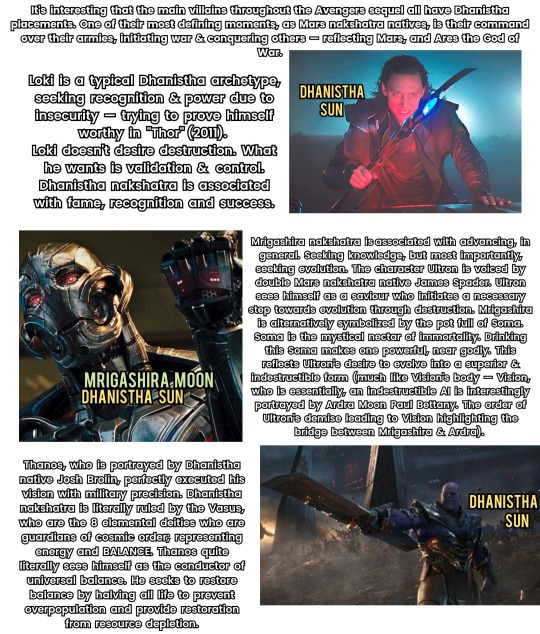
Like the character Thanos, Andhaka saw himself as a necessary force of change, willing to eliminate obstacles — including the Creator (Shiva) — to establish a new order.
Even the character Kylo Ren is another Dhanistha archetype, being played by the Dhanistha Ascendant native Adam Driver. Kylo has a vision of a new order, which is not just about destroying the past, but reshaping the galaxy according to his own ideals.
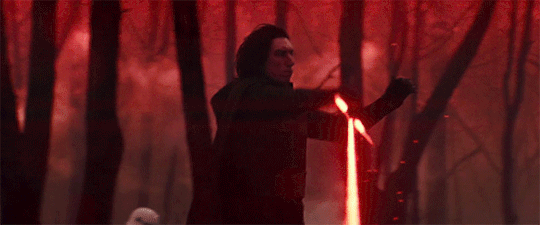
His intensely ambitious and destructive qualities, but also his capacity for transformation, signify the Mars influence. This being a tamasic nakshatra means that it thrives on intensity, chaos, destruction, and rebirth, reflecting his volatility & his drive to tear down the past to build something new (we also see his rise to power when he seizes control of the First Order after killing Snoke, wanting to be his own master rather than to continue to serve a higher authority. Though Dhanistha instills servitude, there's still potential for aggressive rebellion, as this nakshatra reflects self-empowerment — however extreme it may manifest).
Unfortunately, we have seen this mindset, in real time, with world leaders who forced a new order in their own country which essentially became a threat to everyone but them.
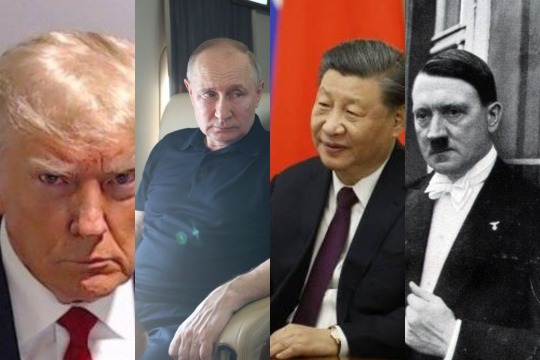
Donald Trump, who has Mrigashira Sun, easily comes to mind. Vladimir Putin, who Donald Trump now wants to take after, could have possible Chitra ASC. Xi Jinping also has Mrigashira Sun. And Adolf Hitler, who had a lot of Mars influence, with Chitra ASC and Ashwini Sun conjunct Mars. Even Benjamin Netanyahu, leading genocide for his fascist visions, has Chitra Sun & Moon. Regardless of all of their different ideals, they are examples of Mars functioning not only as a destabilizing force, but as a domineering one too. It needs submission. And so Martians will always have minions and enablers.
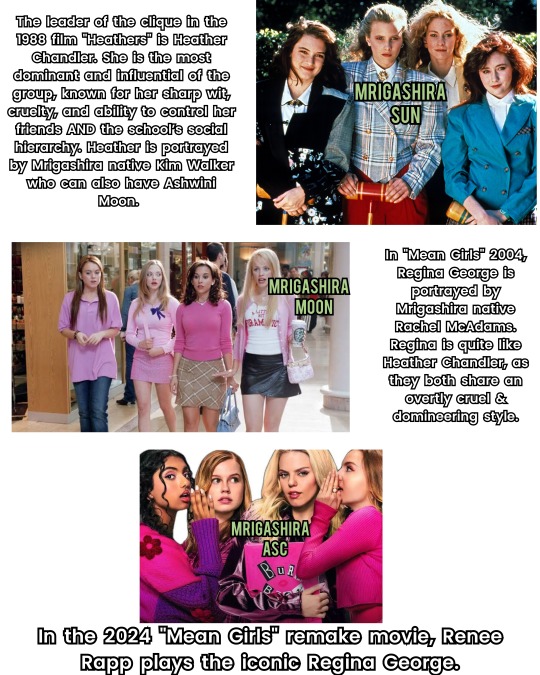
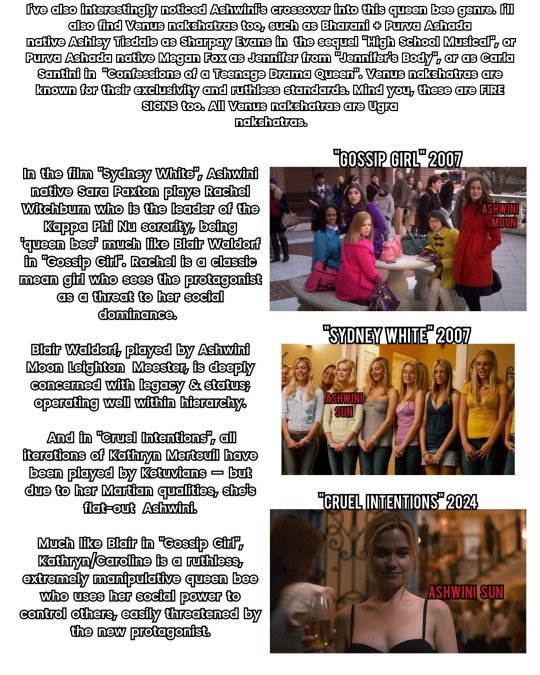
Again, Ashwini is Mars energy at its highest levels due to the nodal influence. And according to Claire Nakti, in her Serial Killer exploration, she states that whatever Ketu is conjunct, the themes of that planet become exaggerated or extreme — due to its sucking receptivity; further giving a perspective on Mars and Ketu energies together — which are both tamasic.
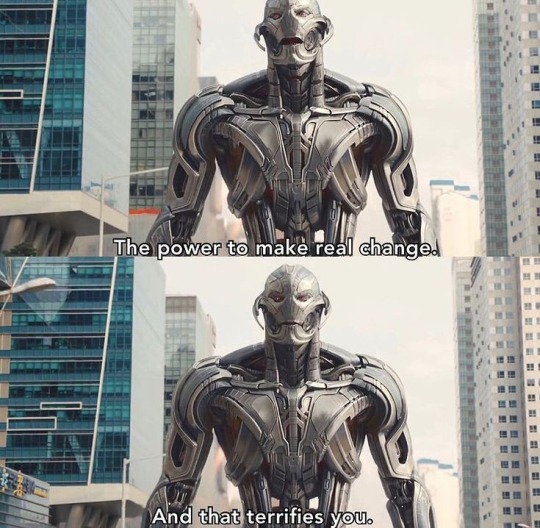
Similarly to Andhaka, Ultron, in his pursuit of ultimate evolution, had a plan to replace flawed organic life with a machine-driven future, much like Andhaka's attempt to overthrow divine order with his newfound strength. Both the mythology and Ultron's story arc portray Mars as an agent of transformation, however destructive it is, in them commanding armies and defying all limitations. Mars breaks barriers, in the first place.
This also means that Mars is a symbol of resistance, rebellion and growth as well. The character Katniss Everdeen, played by Mrigashira Moon native Jennifer Lawrence, in The Hunger Games sequel, stands against an oppressive, totalitarian government — her defiance sparking a revolution which threatens to dismantle the system and ultimately break all barriers to force freedom to all.

This is quite reminiscent of the character Curtis Everett, in the film Snowpiercer, who is played by Mrigashira Sun native Chris Evans. Curtis has held deep resentment for the Wilford's corrupt leadership (basically the elite people) and he is determined to lead a revolt against the elite of the front of the train. Another layer which highlights this character as Martian is his engagement in the horrible violence and chaos that ensues. The film is directed by Chitra Moon native Bong Joon Ho.

Violence is used as an equalizing force, since Mars does not moralize and acts on necessity instead. Counter-violence, in some of these films led by Martian natives, is done to balance power structures, rather than cause annihilation. Violence -> restoration.
Mars, being the warrior archetype, embodies the natural response to oppression with absolute force. So such influence will be often seen in strong, revolutionary leaders — even if they do not outright promote violence as a first resort, you will sense their Martian power. Such as the Ashwini Moon native Malcolm X, who strongly believed in self-defense, criticizing passive resistance.
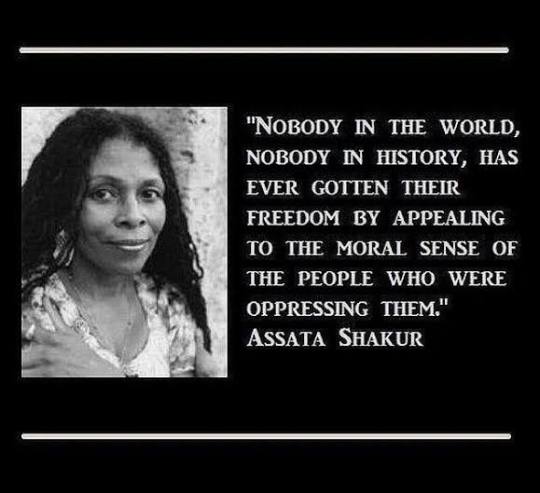
Assata Shakur has Mrigashira Moon.
It is fascinating that Kendrick Lamar, and Tupac Shakur, are considered revolutionary thinkers — both having implemented messages of resistance with their mainstream appeal. Mrigashira Sun, Chitra ASC Kendrick Lamar especially with his aggressive delivery in his album To Pimp a Butterfly, and Mrigashira Sun native Tupac Shakur whose tracks ranged from introspective/political to raw street anthems.
The restless energy in all Mars nakshatras is already responsible for pushing one forward, even to the extremes, to initiate or force change; this being something clearly seen in breaking boundaries or challenging the status quo. Mrigashira’s association with breaking free is rooted in its dual focus on exploration/seeking and self-liberation/evolution, exactly why stagnancy or oppression cannot be allowed any longer — making this a very rebellious nakshatra. This notion of Mars seeking to transcend stagnancy can extend in other themes. This restlessness is seen through sexual impulses in the Netflix series Sex/Life.
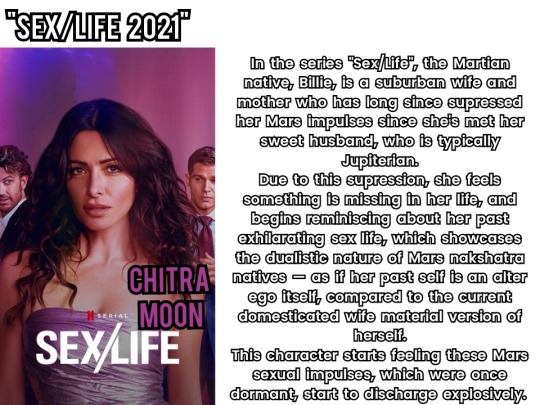
As it is known, Mars in your chart governs one's sex drive and desires. This fiery planet represents passion and attraction. Mars governs primal urges, which include carnal desire, which can be so transformative for the native — similar to the act of violence to restore balance. According to certain Puranic folklore, when Mangala (Mars) sought a consort, he was rejected by various goddesses due to his raw heat. In the series Sex/Life, Billie's primal urges are so fiery and even animalistic that the energy scares her. But she eventually has to embrace that other identity, as Mars deals with raw empowerment. Exactly why natives with this influence quite literally exude sexuality and vitality, which explains why they become sex symbols in the first place.
But Mars, as it carries tamasic and primal energy in its influence, can make people the most evil, violent and domineering if such energy is not used constructively.
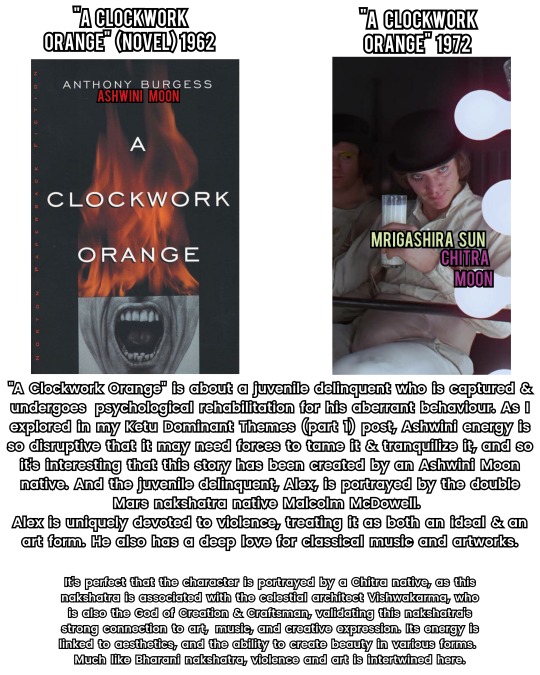
For healthier examples of Mars energy being used constructively, we can look at the film Pump Up the Volume (1990). It stars Chitra Moon Christian Slater, whose character agitates and stirs hidden impulses within the collective, bringing forth suppressed frustrations to the surface through his pirate radio station which gains a large following. His ability to ignite rawness in his listeners, encourage rebellion and self-expression, is something so very Martian. Much like Ketu, Mars can have an intense, subconscious effect on the collective – forcing people to deal with their animalistic nature in an authentic way. Christian Slater's character in Pump Up the Volume becomes the catalyst for unpredictable, at times destructive, reactions — which actually inspire growth more than anything. This film also inspired the Disney movie Radio Rebel (2012), with a similar plot, in which Dhanistha Moon Debby Ryan's character sparks a movement amongst her peers and challenges authority. This theme of being a total disruptor of the status quo or encouraging freedom from restrictive rules is a key element in all Mars influences.
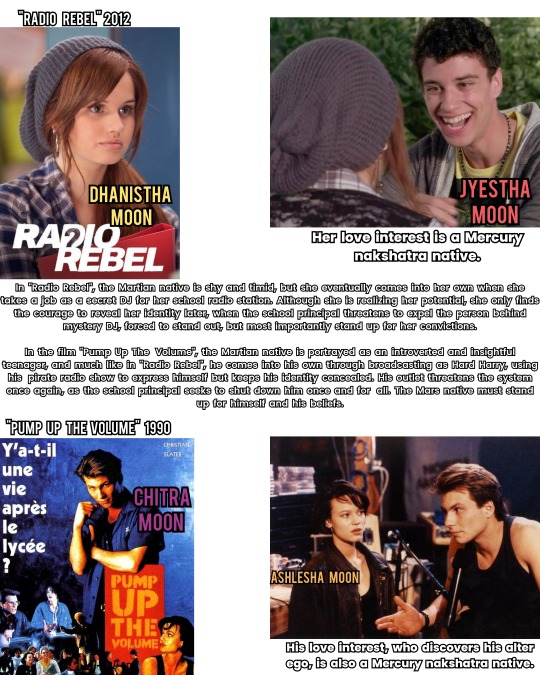
So, the core themes of all of these Mars nakshatras are self-assertion and authenticity, which indicates what is supposed to be cultivated with balancing passion and refinement (Mars pushes for transformation, after all).
This being the planet of raw energy, of impulsive action, and extreme rebellion, can reflect themes of needed chaos and animalistic drive. Both of these movies show the Martian influence behind the incite of radical shifts, often seen in controversy and the destabilization of institutions etc. You will also notice how Mercury nakshatras almost function similarly, especially Revati, the nakshatra of peak expansion, which eliminates all barriers (such as the movie V for Vendetta which is about anarchy). This further supports the constant duo between Mars and Mercury nakshatras.
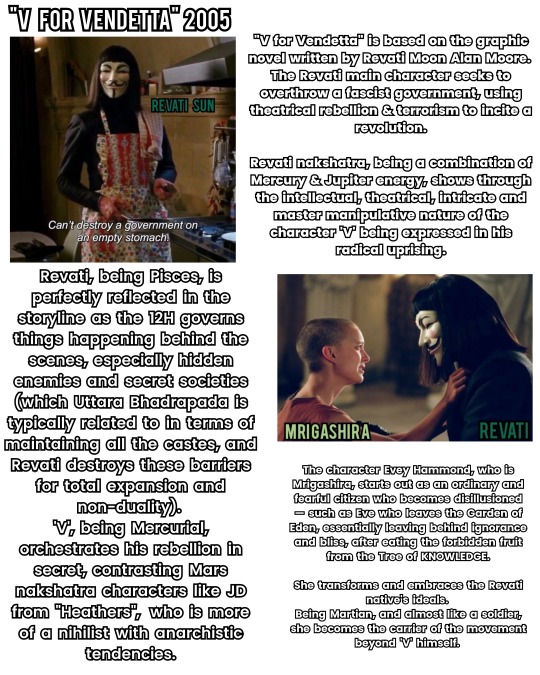
Mars being the literal planet of war, survival, and primal instinct is translated repeatedly in films about lawlessness, violent anarchy, or rebellion, where the main character, usually a Mars nakshatra native, is able to survive using brute force and wit against outward violence & chaos.
The explosive expression of Mars is so perfectly depicted in the movie Mad Max: Fury Road (2015), directed by Chitra Moon native George Miller.

The film's primal core is survival of the fittest, implementing relentless energy in pursuit of the War Rig. And the character Max, played by Chitra Moon native Tom Hardy, represents the perseverance of Mars, able to navigate the chaos & lawlessness with pure instinct and wit — a trait common in all Mars nakshatras as they possess a level of high intelligence.

The plot of the film also includes a violent rebellion against the tyrannical warlord, and the rich cinematography supports the blend of the explosive, fiery nature of Chitra through its artistic genius. George Miller has definitely succeeded in executing his vision, as this nakshatra grants one the ability to express their grand ideas — the Mars rulership giving the native a higher success rate.
Mars nakshatra natives operating as visionaries who are, at times, self-absorbed, or even extremist, definitely points to the urgency and energetic drive which is provided by Mars. And the ability to even dream or think big is provided by the Venus and Mercury influence. The character JD from Heathers is certainly a terrible manifestation of the selfish visionary.
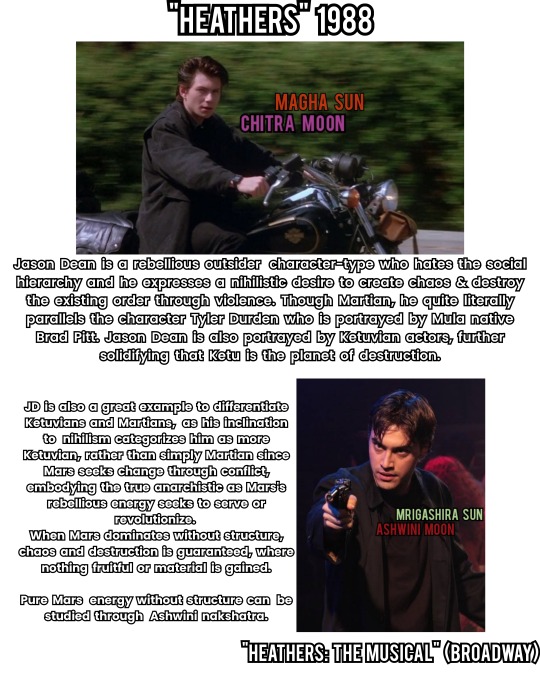
Jason Dean’s need to remake the world (even if it's through mass suicide) and his desire to tear down the oppressive social system in Heathers ties well into the visionary nature of Chitra. He wants to create a "better" world by destroying the old, his motivation making him parallel characters such as Kylo Ren, or even Ultron, in that sense.
As I've spoken of Kakegurui before (the anime & Japanese live-action), I've highlighted Mary Saotome as Martian as she has been portrayed by the Dhanistha natives, Aoi Morikawa & Minami Tanaka. Mary is the typical queen-bee of the school, caring only about maintaining her dominance over others. But then she falls from grace, and she experiences the harsh reality of being at the bottom of the hierarchy.

However, instead of aiming to overthrow the elite system altogether, the powerlessness she feels from being at the bottom fuels her desire to climb back up the ranks and reclaim her dominance. Usually, once the Martian has gotten some taste of power, they're unwilling to let it go. That's why you get these dualistic themes, as someone like Mary Saotome upholds hierarchal systems while someone like Jason Dean wants to destroy them. But, this may also speak to the difference between Dhanishta nakshatra and the earlier Mars nakshatras.
Dhanishta's purpose is to give one the ability to be on top of any hierarchy, which is exactly why its natives can be extremely gifted or resourceful in many things. Dhanistha would be the Mars nakshatra that is likelier to be the non-disruptor, keeping a harmonious nature within society than challenge or rebel against it for radical change, given that this nakshatra is more focused on discipline and gaining power within restrictions (and that is completely due to its Saturn rulership, making it more passive and self-controlled than its prior trine nakshatras).
So the character Mary Saotome is more calculated than violent, as her goal is not to abolish the oppressive system, but to reclaim power within it.
Kylo Ren is similar to Mary Saotome in this regard, as his goal is not to destroy the system, but to seize control of it. He doesn't care about dismantling the Sith or the First Order — he wants to rule over it. Rather than abolishing it, he embraces the Sith-Imperial power structure and works to remake it under his rule. He manipulates, schemes and positions himself to gain power, very similar to Loki, who is played by Dhanistha Sun Tom Hiddleston. Just like Loki, Kylo also has a deep need for validation and power.

Both Jason Dean and Kylo Ren are both driven by anger, rebellion, and a desire to break free from the system — but on their own terms. Though JD believes in destruction, Kylo believes in power. These Martian natives have a singular vision which they spend the majority of the time trying to make a reality. Both of them fall in love, or form an intense connection, with a Mercury nakshatra native who start off idealistic and resistant to the Martian's radical, destructive methods. Rey is played by Revati Sun Daisy Ridley and Veronica Sawyer is played by the Jyestha Ascendant native Winona Ryder. Both Rey and Veronica are challenged to join the dark side with their Martian counterparts, as JD wants Veronica to embrace the chaos and destruction with him, while Kylo wants Rey to rule alongside him.

The very reason why these Mercury nakshatra natives find themselves in an interplay with Mars nakshatra natives is because of their similarities. Rey grew up abandoned and powerless, resenting the idea that worth and power was only reserved for certain bloodlines — typical of Revati nakshatra as it symbolizes the search for belonging and completion (she didn’t fit anywhere in any hierarchy, as she floated between worlds; which supports the purpose of this nakshatra to transcend beyond the material <hence why it's called the Wealthy Star, regardless of humble beginnings>, as Revati is ruled by Pushan, the shepherd deity who guides lost souls). And when Kylo voices her frustration, saying to her, "You have no place in this story," this validates her anger and loneliness, as he, too, rejects the rigid power structures that tried to control him. While Veronica despises the toxic social order of her school, where the Heathers dominate, and cruelty is rewarded (her ability to see through the illusions of popularity & power without getting sucked into the superficiality reflects Jyestha’s sharp awareness & strong resilience). JD's desire to burn it all down initially excites Veronica, only to then scare her away because his destructive, power-driven acts make him no different to the tyrants she wanted nothing to do with in the first place.
To the theme of lawlessness, the film The Purge (2013), quickly comes to mind. It is directed by James DeMonaco, who has his Sun and Moon in Chitra nakshatra, about the institutional breakdown of a government which legalizes crime for one night, encouraging unrestrained Mars energy at its purest.
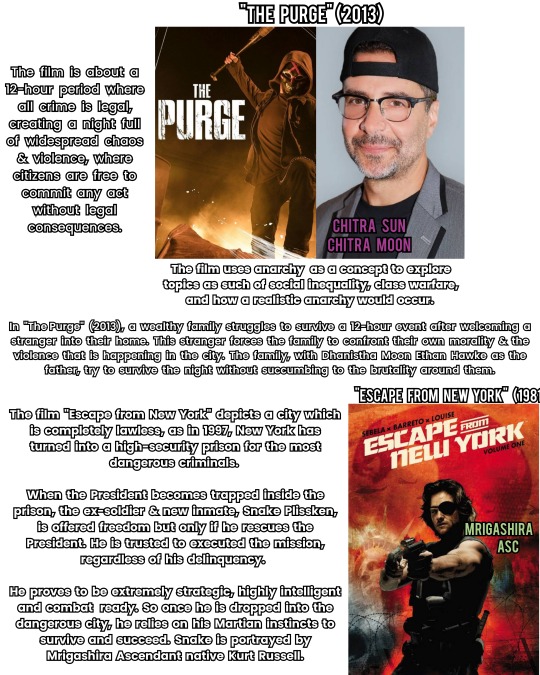
The film Escape from New York (1981) also has an aspect of lawlessness to it, as New York City is basically a prison to the most dangerous inmates ever — making it a chaotic jungle. It stars Mrigashira ASC native Kurt Russell who plays the character Snake Plissken. He embodies the combination of Mars and Gemini energy, always having a strategy and being constantly on the move. And like a Martian native, he questions authority and doesn't follow orders blindly, having a rebellious edge to him. His survivalist mentality reflects Mrigashira being a nakshatra of searching and surviving, giving one the ability to thrive in dangerous environments (the nakshatra being symbolized by the deer further signifies alertness and perception).
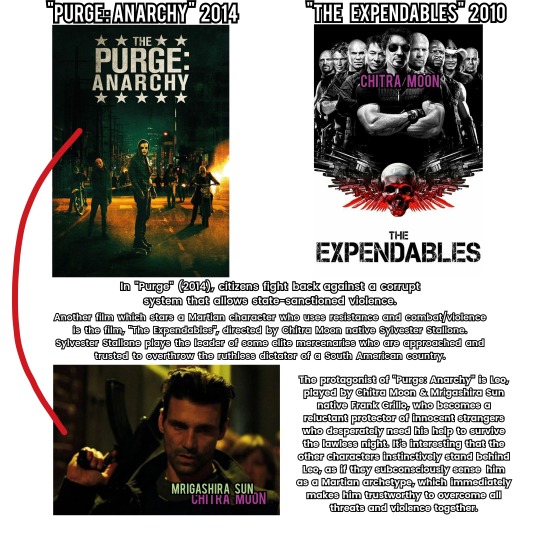
Martians also falling into warrior archetypes is the least surprising, and it's interesting that they are intuitively cast in huntress roles as well. Mrigashira is linked to tracking, making sense of the obvious connections to the genre of bounty hunting. This nakshatra literally embodies the mindset of a seeker, and due to the Mars influence, extends further to the mind of a huntress. Bounty hunters rely on strategy, intelligence, and tracking abilities to locate fugitives. Mrigashira, being ruled by Soma (Moon), which governs intuition, instinct and adaptability, supports the skillset of the bounty hunter even more.
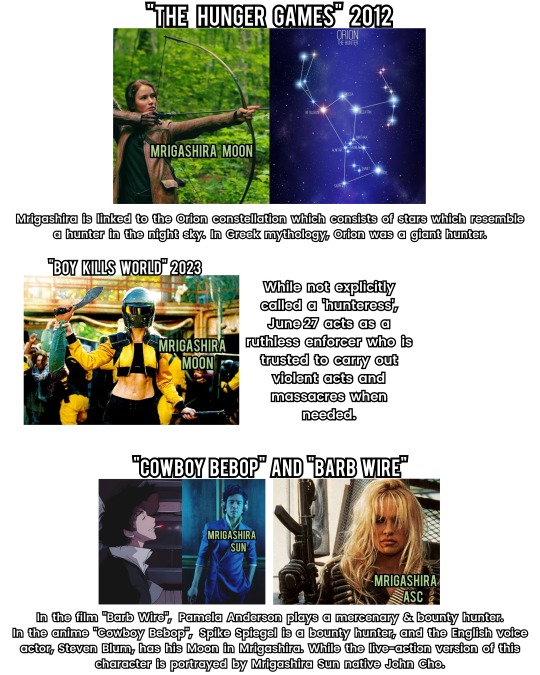
In the series The Mandalorian, Din Djarin was a bounty hunter who is portrayed by the Mrigashira ASC native Pedro Pascal. In the 1977 film A Man Called Blade, Blade is a hatchet-wielding bounty hunter with a dark past who is played by the Dhanistha Sun & Moon native Maurizio Merli. In Star Wars, Boba Fett is regarded as one of the most fearsome and capable bounty hunters, and he was played by Dhanistha Sun Jeremy Bulloch.
The Mars nakshatras being in both Earth and Air rashi sections points to the importance of structure vs fluidity, suggesting that Mars is mastering both the physical and mental battlefields. The whole mastermind archetype perfectly aligns with these nakshatras, specifically Mrigashira, the nakshatra of the eternal quest for knowledge.

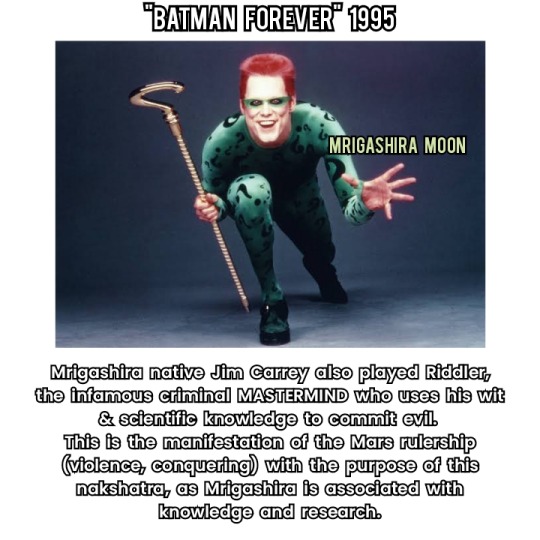
The strategy of Mars, the creativity of Venus (Libra/Taurus), and the craftiness of Mercury (Gemini/Virgo), can make for a theatrical trickster, instigator or mastermind, as seen with the character the Riddler.
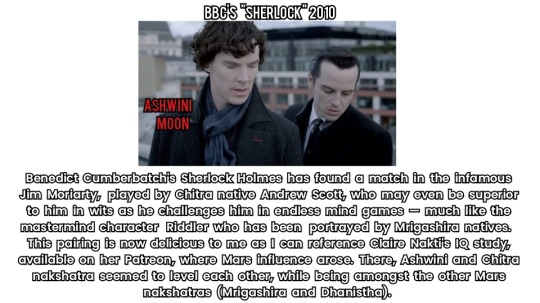
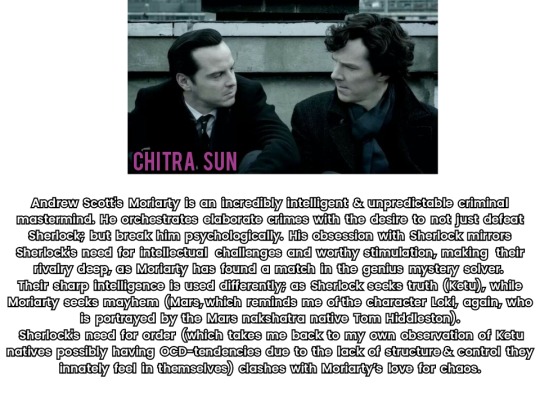
As Mars is associated with the head, since it is co-ruling Aries (and the head is more emphasized in Ashwini nakshatra, symbolized by a horse's head which signifies qualities of swiftness such as quick wit); this means that Mars drives intellect, providing one the energy to slice through life with strategy and dominance with accumulated knowledge to defeat opponents, giving one the gift in noticing details that nobody else would (this ability often arises when an individual is on survival-mode, further showing how Mars, being associated with survival of the fittest, makes its natives have a keen sense of awareness). This is exactly why Mars nakshatras are often found in medias that have to do with solving mysteries.
Miss Marple is literally the original female detective. She is an elderly amateur, consulting detective who has been prominently played by Mars nakshatra natives. Throughout many film adaptions, she has been portrayed by the following actresses; Chitra ASC Gracie Fields, Chitra Suns Angela Lansbury and Helen Hayes, Chitra Moon Geraldine McEwan, Dhanistha Moon Joan Hickson, Dhanistha Sun Julia McKenzie. In the series DI Ray, Chitra Moon Parminder Nagra plays a Birmingham-based detective. In the series The Fall, Dhanistha Moon Gillian Anderson is a sharp, determined detective. It reminds me of the relentless detective in the Spanish series Berlin, played by Dhanistha Sun & Moon native Najwa Nimri. Though you'll see Ketu nakshatra natives take up this genre as well, it seems to be dominated by Mars influence. In the film Silence of the Lambs, Magha Moon Jodie Foster plays detective Sterling who is the fixation of a terrifying serial killer; in Hannibal, Jodie Foster is replaced by the Mrigashira Moon & ASC native Julianne Moore, continuing the story as detective Sterling who finds herself in what you'd consider a dark romance, or game of prey-&-predator, with Hannibal (which has to do with Mrigashira nakshatra, in general, more than it just being a Mars nakshatra).
So high IQ, beauty, mass appeal, and dominance can be a full package when it comes to Mars nakshatras. Each Mars nakshatra may provide one with a gift to expand one into elite rooms or into higher positions of power.
Dhanishta nakshatra possesses Khyapayitri Shakti, which is the power to bring fame and abundance. Mrigashira nakshatra, with its seeking nature, is powered by Prinana Shakti, which gives fulfillment. Chitra nakshatra, ruled by Tvashtar, who is the cosmic craftsman, has the ability to accumulate good merit in life from being powered by the Punya Chayani Shakti.
As Dhanistha is associated with rhythm & performance, Mrigashira being partially ruled by Venus, and Chitra's deity, Tvashtar, being the god of artisans and fashioning, it comes as no surprise that these nakshatras are prominently found in the art, entertainment, and fashion industry or in celebrity culture in general. Often the faces of the glitz and glamour.

Chitra especially, since it signifies beauty, meticulousness and expressing imagination on the material plane. Chitra is literally the nakshatra of the visionary.
The Disney princesses I'd confidently associate with Chitra are Moana and Ariel. As this nakshatra is symbolized by the pearl, it points to the pursuit of brilliance. And like the pearl hidden in the ocean, their path involves venturing the unknown, seeking newfound radiance or, similar to Mrigashira, finally capturing the higher power they've always been seeking — showing just how these natives are deeply aligned to fate. Mars provides these characters with enough enthusiasm and restlessness to fulfill that destiny.
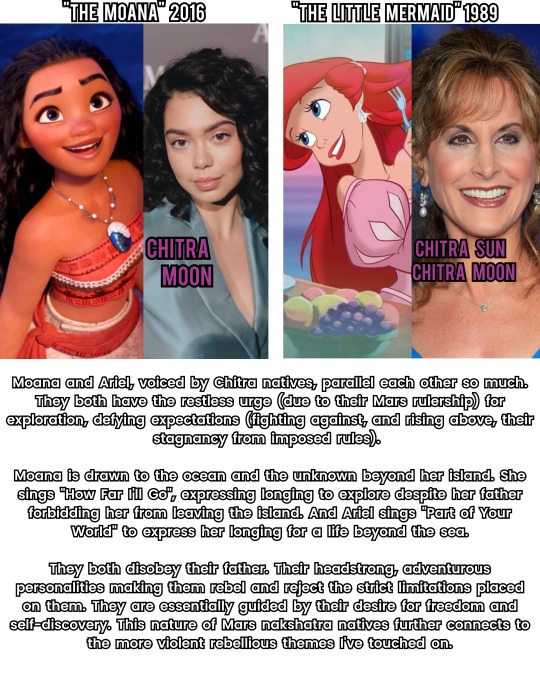
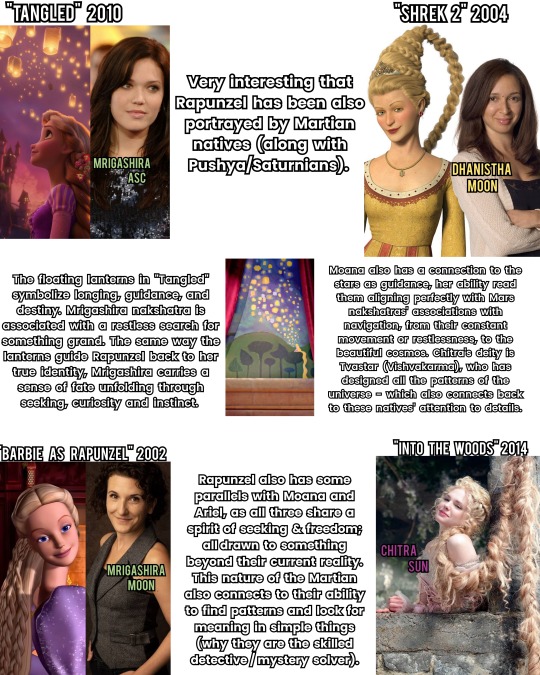
Mrigashira, Chitra, and Dhanistha each embody core themes which have to do with the relentless pursuit of fulfilment, whether it be alignment with one's true identity (such as through Mrigashira's trope of memory loss, or Rapunzel retracing her true roots), or knowledge, mastery, status/validation, or freedom. All three nakshatras make individuals challenge their own limitations, as they are a force of growth themselves. This falls perfectly well into the warrior archetype which defies hierarchy and reshapes their reality through strategy, ambition, rebellion, and even violence.
All of this just to say, they have the power of INFLUENCE and IMMENSE GROWTH.
#vedic astrology#astrology#sidereal astrology#mars#mrigashira#chitra#dhanistha#taurus#gemini#libra#virgo#capricorn#aquarius#astro observations#sidereal observations#astrology observations#vedic observations#nakshatra series#jyestha#revati#ashwini#ashlesha#mercury#pisces
500 notes
·
View notes
Text
(im back, christmas break is here!!)
tw: mentions of abuse, violence, sexism (but secondary gender), omegaverse dynamics, crying, heavy angst no aftercare (again)
The uncomfortable tension in the room was palpable as they all sat in their usual debriefing room. Usually, the nest was a place for such a personal and volatile topic such as this, but none of them felt worthy of being there now. Not with how they’d treated you.
Soap was tapping his foot against the floor, the pattern uneven and sporadic, until Gaz snapped at him.
“Could you quit it, mate?” It had come out harsher than he’d meant. Soap huffed through his nose but obliged. They were all tense and on edge, their usually oh-so-controlled scents now sour and bitter with unease and anxiety.
In the field, they had their skills and weapons to fix problems, to take out the enemy. But here, back home? They had absolutely nothing in this fight. No amount of backup or fights could win this for them. In this fight, they were the enemy, and the only way to win this was by fixing the sacred little strand keeping you together that they had so carelessly unwound until it had snapped.
Ghost looked to Price. His hand was in his beard, thoughtfully running through the hair, stressed as Ghost has ever seen him. A sour pang of guilt shot through him. If he hadn’t tried forcing you to his scent gland, then you wouldn’t be in this position, and he wouldn’t have messed everything up, again—
“Y’re thinking too much.”
Price muttered, Simon’s feelings clear through the thick scent that somehow seemed to overpower everyone else’s in the air. He swallowed thickly. They needed a plan of action, some way to fix this, and the only way Price saw things being mended was by a lot of time and effort.
Gaz let the silence simmer for a moment, before speaking up.
“Cane Baker Syndrome, I looked it up yesterday night, it’s just like the med’ said. PTSD. Do you think…?”
An alpha being abused wasn’t as commonplace as it had used to be. Only 50 years ago, if you’d stepped into the common era, you’d see alpha’s being forced to work for a family they’d been forced into providing, their protective instincts abused. Among the more insane practices had been scratching out an alpha’s scent gland, so they couldn’t scent or get attached to their offspring, meaning the omega got the child all to themselves.
Awful things such as that had been outlawed years ago, but still happened in little forgotten corners of the world where loopholes existed.
“We can’t know for sure, but based on their reaction, I’d say we have a safe assumption. When they’re in a better….state of mind, we can ask a few questions.”
Price answered, voice heavy with an edge of guilt that seemed to grow richer by the second. Soap’s incessant tapping started up again, anxiety clearly chewing away at him. He couldn’t defuse you or the situation they’d created so easily like any other bomb he might during a mission.
“Could we get a background check on them?”
He asked, a hint of desperation in his tone. All he wanted was for you to be better again, for things to go back to normal, for a second chance.
But as they all split up, and he went to the nest, usually all so warm and comfortable and smelling of their sweet, rich scents combined, all he found was isolation among his team, sour scents mingling with rotten ones, a few sniffles and the salty scent of tears, he knew one thing.
They’d made their bed. Now they had to lie in it.
(sorry for the short part I’ve been playing cod bo6 multiplayer a lot and I’m kinda addicted + depressive episode, but there’ll be more soon I promise!!)
Part 1 | Part 2 | Part 3 | Part 4 | Part 5
#writers on tumblr#cod soap#cod ghost#gaz cod#captain johnathan price#captain john price#john price#john price x reader#simon ghost riley x reader#Simon riley#simon ghost riley#kyle Gaz garrick#kyle gaz garrick x reader#kyle garrick x reader#johnny soap mactavish#john soap mctavish x reader#john soap mactavish#poly!141#cod omegaverse#cod fanfic#task force 141 x reader#141 x reader#cod 141#task force 141
589 notes
·
View notes
Text
Okay can we talk about Scott and his relationship with love and sacrifice throughout the seasons? Because like, there are some goddamn patterns First there's Third Life, and I like to say that this is Scott at his best. And by best I mean most emotionally available. Scott is very expressive during this season, because he loves Jimmy, and for that is keeping the peace. Scott is the mediator, he wants a happy life and he does his goddamn best to keep that life. And when he's forced to choose a side he does it with the people he's already friends with. And then Jimmy dies and he is heartbroken. And then when the self-sacrificing starts. Like Third Life is the definitive worst Scott has done and that's because he was entirely throwing caution out the window. He grieves Jimmy and then decides that it was due to him not being there, that if only he had been there (despite already dying and not having control of the situation) things would've been different. So he spends the rest of the season like a suicide-bomber, doing his best for his remaining friends. Then there's last life, and this is when Scott becomes closed off. After the grief of Jimmy and knowing how much feeling things hurts, he plays it different. He befriends Pearl because she's new and has something to give him, plus, she's volatile, a wild card. Chaos that can defend herself. So he treats it like a vacation. Of course he's still cautious, but now he's detached himself from his emotions. Obviously he stills cares about Pearl, she is his supposes reason for winning. But the way he treats emotions with Pearl and Jimmy are very different. He was way more earnestly open about his feelings with Jimmy. And when he decides to just go red from the boogeyman, that's another case of him loving his friends too much to go after them, and the only way he can help is to take action. When he wins it's for Pearl. But he doesn't end it with Pearl, he ends it with his pet axolotl. Something that is far less telling of his care for people.
And then when Double Life rolls around he realizes how much she actually cared about him. And that scares him. That scares him right off. The idea that if she gets him to open his heart again that he'll be hurt again. So he goes to Cleo who he knows won't care, they've always been closed off and sarcastic, they won't care if he upkeeps bonds or not, they won't care about the lovey-dovey. And throughout the whole season he's pushing Pearl away because he's scared of being opened back up. And at the end he knows he's done her wrong, so he does the thing Scott Smajor does best, decides that she deserves life more than him. Limited Life is god's most unhealthy coping mechanism ever. He went and got himself a surrogate husband who would ignore everything that would happen that season. Martyn does not give a damn about previous seasons unless your name is Ren. Scott picked the guy most likely to betray him and went "hey we're both sad and hurt, let's team up" and was sooo ready for Martyn to kill him. AND HE STILL CARES ABOUT HIM. He still checks up on him and helps with his Birthday and asks Martyn to kill him because he thinks his only use is dying for his loved ones. AND he offers up his life to both Cleo AND Jimmy this season. He is so twisted up in the past this season, and in an awkward phase of healing with Pearl. Secret Life is I think when we reach peak-standard happy-emotionless Scott. He's in his band and he is living life and ignoring the horrors. He's a friendly calm, collected, not showing fear guy. He says "I love you" to everyone and is infuriatingly collected when people spend entire sessions out to kill him. Of course he sacrifices himself to Gem TWICE this season. He has a problem. Real life is Pearl reconciliation hour. And then Wild Life. My god, Wild Life. Cleo is old reliable, Impulse is nice to team with, and he made up with Pearl. And for the first bit he's doing the norm, he's close, but not outwardly expressing it in tangible ways. And he's mister peacekeeper. But pearl and Impulse are messing it up, he's trying to be friends with Gem and Joel but his teammates are ruining this. And he's not the universal best friend. He's not the guy you casually hand around in his base with. He's teamed with Mister and Miss Chaos. AND HE ACQUIESCES, he goes "yeah, burn down their house. Yeah, kill that guy". His teammates, which he knows are the problem but goddammit Scott is loyal , so he decides Gem and Joel are ruining this. THEY have stripped away his persona. His trustworthy-ness. He guns it after both of them, his happy cracks and spills out anger. It's the second worst he's placed because he stopped trying to lie and listened to his emotions. +he's gotta let Pearl kill him, tis tradition. It's the fact that Scott within the life series is hated by the watchers due to his ability to LOVE. It's the fact they don't feed well off him because he doesn't hold tangible grudges. It's the fact that Scott loves so desperately and bad that he has tied his own well-being to how well others are doing, if Scott is doing well he gives it to his teammate because then it must be HIS fault that they're worse off. By being too nice and too calm, people don't realize his connections with people are real. And if they don't love him back then he won't have to be heartbroken. Scott has weaponized love, against the watchers, against his peers, and most importantly, against himself.
#scott smajor#smajor1995#jimmy solidarity#flower husbands#zombiecleo#pearlescentmoon#martyn inthelittlewood#mean gills#impulsesv#geminitay#third life series#life series#traffic life#traffic series
367 notes
·
View notes
Text
How the Chantry (and Orlais) Turned Kirkwall into a Police State
One aspect of the Dragon Age series that I’ve always found odd is the way in which rather crucial political and historical context surrounding major conflicts the player must decide tends to be relegated to codices, outside materials (e.g., books), and optional dialogue with minor characters... meaning that many if not most players don’t seem to end up actually seeing it. Wicked Eyes and Wicked Hearts (Dragon Age Inquisition) in particular has become somewhat notorious for what it left out, but it’s far from unusual.
With regard to Dragon Age II, there’s a popular perception among fans that the troubles in Kirkwall can be attributed almost entirely to rogue behavior on the part of Knight-Commander Meredith and various evil blood mages. This is understandable given the overall narrative framing and Bioware’s aforementioned problem of making key context very easy to miss. But once we take a look at the full picture, it ought to be clear that the Chantry did not simply “fail” in their responsibilities towards the mages or towards the citizens of Kirkwall more broadly — they actively created and maintained the very nightmare they later professed to be dismayed about.
Moreover, despite the running Mages vs. Templars theme, the mages were hardly the only one's who suffered under Meredith's rule. Indeed, Kirkwall endured a brutal 16-year-long dictatorship (9:21-9:37 Dragon) that came into being courtesy of the Chantry and the Orlesian empire and only fell due to the mage rebellion.
Here I’ll describe in detail (with sources and citations) the story of how the Chantry turned Kirkwall into a police state and one that ultimately descended into what the writers themselves termed "genocide."
The Templar Coup of 9:21 Dragon
Our story begins with the conflict between Viscount Perrin Threnhold of Kirkwall and Emperor Florian Valmont of Orlais.
With the beginning of the Dragon Age (the era), the Orlais had experienced a major loss of territory and influence. In 9:00-9:02 Dragon (the exact dates conflict), the Fereldan Rebellion led by Maric Theirin and Loghain Mac Tir overthrew Meghren, the last Orlesian King of Ferelden (personally appointed to the position by Emperor Florian himself), and reclaimed their country’s independence after nearly a century of Orlesian occupation. These events are described in detail in The Stolen Throne. Emperor Florian, however, remained reluctant to recognize Ferelden’s sovereignty -- with peace between the two countries not being fully established until his death and the ascension of his niece Celene to the throne in 9:20 Dragon -- and may have been eager to reassert Orlesian influence in the region. Perrin Threnhold, meanwhile, ascended to the position of viscount of Kirkwall (also formerly occupied by Orlais) in 9:14 Dragon. At some point during this volatile period, Threnhold decided to raise money by charging what the Orlesians regarded as unreasonably high tolls for passage through the Waking Sea, which also controlled Orlais’s sea access to Ferelden and its capitol, Denerim.
For reference, here’s a map with my highlights:
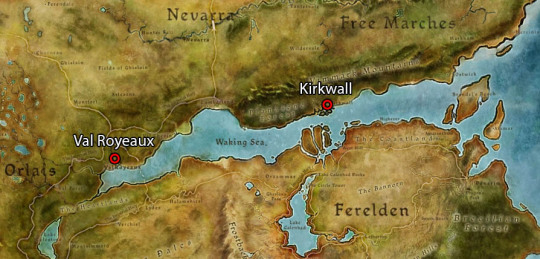
The Orlesian Chantry, founded by Kordillus Drakon I (the first emperor of Orlais), had from the beginning been dominated by Orlesian interests. According to World of Thedas vol. 1 (p. 56): “The Orlesian capital, Val Royeaux, is home to the Chantry’s Grand Cathedral, the center of the Andrastian religion’s power. Over multiple Blights, the Orlesians have used the Chantry to expand their influence beyond the nation’s impressive borders, notably to the north into Tevinter territory and southeast through Ferelden.” The Chantry, not surprisingly, had backed the Orlesian invasion and occupation of Ferelden, most recently under Divine Beatrix III (probably) and Grand Cleric Bronach of Denerim. It should be noted that this is all part of a pattern of highly-aggressive and imperialistic behavior that has persisted for centuries from the early years up to (potentially) the events of Dragon Age Inquisition.
It also cannot be emphasized enough that the Templars are the Chantry’s army and were created by the Chantry in the first place. They do not simply hunt and guard mages; they fight the Chantry’s wars and carry out its policies. Quote: “the Order of Templars was created as the martial arm of the Chantry” (Codex: Templars). According to First Enchanter Halden of Starkhaven (8:80 Blessed), “While mages often resent the templars as symbols of the Chantry's control over magic, the people of Thedas see them as saviors and holy warriors, champions of all that is good, armed with piety enough to protect the world from the ravages of foul magic. In reality, the Chantry's militant arm looks first for skilled warriors with unshakable faith in the Maker, with a flawless moral center as a secondary concern. Templars must carry out their duty with an emotional distance, and the Order of Templars prefers soldiers with religious fervor and absolute loyalty over paragons of virtue who might question orders when it comes time to make difficult choices. It is this sense of ruthless piety that most frightens mages when they draw the templars' attention: When the templars are sent to eliminate a possible blood mage, there is no reasoning with them, and if the templars are prepared, the mage's magic is all but useless. Driven by their faith, the templars are one of the most feared and respected forces in Thedas” (Codex: Templars). Likewise, a Chantry official confirms that the Templars are both “the watchers of the mages and the martial arm of the Chantry” (Codex: Seekers of Truth). In Dragon Age Origins, the (unwillingly) Templar-trained Alistair elaborates, “Essentially they’re trained to fight. The Chantry would tell you that the templars exist simply to defend, but don’t let them fool you. They’re an army... The Chantry keeps a close reign on its templars. We are given lyrium to help develop our magical talents, you see… which means we become addicted. And since the Chantry controls the lyrium trade with the dwarves… well, I’m sure you can put two and two together... The Chantry usually doesn’t let their templars get away, either.”
In response to Threnhold’s intolerable restrictions on the Orlesian navy’s movements in its traditional sphere of influence, Divine Beatrix III, an acknowledged “friend of the emperor” (and predecessor to Divine Justinia V of DAI), ordered the Kirkwall Templars under Knight-Commander Guylian to force open the Waking Sea. Viscount Threnhold retaliated for this obviously-illegal military interference by ordering the Templars expelled from Kirkwall and later executing the knight-commander. Then-Knight-Captain Meredith Stannard led the remaining Templars to storm the Keep and arrest Threnhold before appointing a weak viscount unwilling or unable to resist her control.
From Kirkwall: City of Chains by Brother Ferdinand Genitivi (Codex: History of Kirkwall: Chapter 4):
Taxes were crippling and Perrin Threnhold used the ancient chains extending from “the Twins” standing at Kirkwall's harbor—unused since the New Exalted Marches—to block sea traffic and charge exorbitant fees from Orlesian ships. The Empire threatened invasion following the closure of the Waking Sea passage, and for the first time, the Chantry used the templars to pressure the viscount. Until that point, the templars had done nothing to counter the Threnholds even though, as the largest armed force in Kirkwall, they could have. Knight-Commander Guylian's only written comment was in a letter to Divine Beatrix III: “It is not our place to interfere in political affairs. We are here to safeguard the city against magic, not against itself.” The divine, as a friend to the emperor, clearly had other ideas.
In response, Viscount Perrin hired a mercenary army, forcing a showdown with the templars. They stormed the Gallows and hung Knight-Commander Guylian, igniting a series of battles that ended with Perrin's arrest and the last of his family's rule. The templars were hailed as heroes, and even though they wished to remain out of Kirkwall's affairs, it was now forced upon them. Knight-Commander Meredith appointed Lord Marlowe Dumar as the new viscount in 9:21 Dragon and she has remained influential in the city's rule ever since.
Given that this was written by a Chantry scholar, the self-justificatory rhetoric surrounding the viscount and the Chantry-instigated coup ought not be surprising. It appears, however, that in Kirkwall itself popular perceptions of Viscount Perrin Threnhold are in fact fairly polarized.
Whereas Brother Genitivi calls Perrin’s father Chivalry Threnhold “a vicious thug who took power through a campaign of intimidation” and Perrin Threnhold “even worse,” an unnamed servant writing 7 years after the coup paints a rather different picture (Codex: Viscount Marlowe Dumar):
What happened to Viscount Perrin Threnhold was a travesty. I served in the Keep, and my blood boils when I hear people call him a tyrant. He was a good man who tried his best to free Kirkwall from the control of those who use power for their own purposes. It's always been that way here, hasn't it? Long ago it was the Imperium. Then it was the Qunari, then the Orlesians, now the templars... when have we ever ruled ourselves? He tried to kick those templar bastards out and give us real freedom, and what did it get him?
Whether Threnhold was an evil tyrant or a nationalist hero (or both or something else entirely) is beside the point, however. He was not overthrown for mistreating the citizens of Kirkwall; he was overthrown for opposing Orlais and the Templars (acting as an arm of Orlesian imperialism and in defiance of their official duties). Seneschal Bran, himself no fan of either Threnhold or the Templars (and the only character to ever discuss the coup out loud), points this out in an easy-to-miss optional conversation in Act 3.
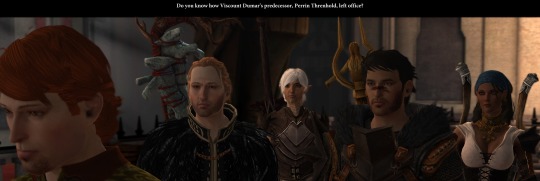


Hawke: What happens if they [the Templars] don’t like the [nobility’s] choice [of viscount]?
Seneschal Bran: Do you know how Viscount Dumar’s predecessor, Perrin Threnhold, left office? He was a tyrant, certainly, but his rule was not ended until he actively sought to expel the templars. “The good of all” is inexorably tied to what is good for the templars.
It’s unclear whether Knight-Captain Meredith was acting on her own initiative in toppling Threnhold or whether she received prior encouragement from the Chantry, but either way, what is certain is that the Chantry moved quickly to legitimize her actions and bolster the new order. Moreover, the intent to seize power for the Chantry and its military forces rather than “liberate” Kirkwall from the depredations of a tyrannical viscount can be seen in the way they illegally imposed their own viscount (one kept submissive through threats of violence) rather than allowing the people to choose or at the very least following accepted selection procedures (i.e., allowing the nobility to vote on the next viscount). Indeed, this refusal to let the nobility select the viscount as per tradition is the basis of Orsino's protest at the beginning of Act 3.
In any event, Grand Cleric Elthina, as the highest-ranking representative of the Chantry in Kirkwall (appointed to her position by Divine Beatrix III herself around 20 years before Act 1) and thus exercising authority over its Templars, presided over the show trial at the end of which Threnhold was imprisoned and later murdered in his cell. Then she rewarded Meredith with a promotion.
According to the codex for Knight-Commander Meredith:
She is credited with removing the previous viscount, Perrin Threnhold, from his position after he attempted to have the templars expelled from the city in 9:21 Dragon. The acting knight-commander was arrested and executed, and Meredith led a group of templars into the heart of the Keep to capture Threnhold. He was tried and imprisoned three days later by Grand Cleric Elthina and died from poisoning two years later. Meredith was subsequently elevated to her current position.
While merely implied here, Elthina is explicitly confirmed to have given Meredith the position of knight-commander in the first place in World of Thedas vol. 2 (p. 193):
Following Threnhold’s arrest, Grand Cleric Elthina appointed Meredith as the new knight-commander. At Knight-Commander Meredith’s suggestion, a new viscount was chosen: a man named Marlowe Dumar.
Then in blatant violation of Kirkwall’s own laws and traditions -- again, dictating that the viscount be chosen by the nobility -- the Chantry had allowed newly-installed Knight-Commander Meredith to select the new viscount. If approached in the Templar-occupied Viscount’s Keep and spoken to in Act 3, Seneschal Bran will explain:
Bran: When a line is judged unfit, or ends, we appoint from Kirkwall’s elite. Or we would, if the situation was normal. But it is not.
Hawke: Who nominates a new viscount?
Bran: A consensus of the nobility. Normally. And a willing nominee.
It seems to be the general consensus that Marlowe Dumar was chosen specifically because he was weak and willing to play the role of Templar/Chantry puppet (a subheading in Dumar’s WoT v2 entry even explicitly calls him “The Puppet”). Meredith, after all, is not only responsible for his appointment but has been threatening him into compliance from the very beginning.
Again, Brother Genitivi writes quite bluntly:
Knight-Commander Meredith appointed Lord Marlowe Dumar as the new viscount in 9:21 Dragon and she has remained influential in the city's rule ever since.
And quoting once more from the unnamed servant:
Now the Chantry has chosen Lord Marlowe Dumar as his replacement. After weeks and weeks of arguing, after telling the nobility that they would be choosing their viscount, after everyone saying it was time to use a new title—why not "king"? Why keep using the name imposed by the Orlesians? And after all that, the Chantry chose him. I suppose I can see why—everyone thinks he has the spine of a jellyfish, and it does seem that way.
Truly, he has the templars on one side, the nobility on the other, and everyone expects him to solve all their problems—yet he has no power to actually accomplish it. He keeps the peace as best he can, and I think he does a good job even if no one else does.
Likewise, to quote from Marlowe Dumar’s entry in World of Thedas vol. 2 (p. 184-185):
The new knight-commander, Meredith, appointed Marlowe to the seat, much to his surprise. Just before he was crowned, he met in private with the knight-commander at the Gallows. Marlowe was escorted, surrounded by grim templars, to Meredith’s well-appointed office, and there, she explained her reasons for the choice. Kirkwall was filled with entitled degenerates... “With my help, you will turn this city around,” she said. “We will be allies.” Meredith’s message was clear: Remember who holds power in Kirkwall. Remember what happened to Threnhold when he overreached. To drive her point home, she presented Marlowe with a small carven ivory box at his coronation. The box contained the Threnhold signet ring, misshapen, and crusted with blood. On the inside of the lid were written the words “His fate need not be yours.” Marlowe ruled Kirkwall without incident for almost a decade, in no small part thanks to Meredith’s backing. During his reign, the templars grew even more powerful, and the knight-commander’s influence was evident in almost every one of Marlowe’s decisions.
And from Meredith’s entry in WoT vol. 2 (p. 193):
Meredith presented Dumar with a carved ivory box at his crowning. All present witnessed the viscount going white as a sheet as he opened it... It is not known what the box contained, but the reaction from Dumar made its importance to him obvious. What is certain is that Dumar never openly or strongly defied the templars. Over the course of his reign, Meredith’s grip on Kirkwall grew ever tighter, and Dumar’s failure to act absolutely contributed to the events that led to the mage rebellion.
According to Lord Bellamy, “a longtime political ally of Dumar’s” (p. 193):
“Dumar had a good heart. A good heart and a weak will. On his own he might have made a good leader, given time. But he wasn’t on his own. The knight-commander was always there, looking over his shoulder. She let him know she was watching, that he wore the crown at her sufferance. Meredith appointed him. This was a nobleman of only moderate wealth, with little influence. She knew she could control him and there was little he or anyone else could do about it.”
Ultimately, the coup not only secured Chantry control over Kirkwall but furthered their (and the Orlesian Empire’s) geopolitical interests in the Free Marches as a whole. After all, the “Free Marches is [sic] best known as the breadbasket of Thedas. Its farms along the banks of the great Minanter river are the source of much of the continent’s food” (World of Thedas vol. 1, p. 65), and as with many a real-world “breadbasket,” its natural abundance and misfortune of lying between multiple empires had made it the target of one invasion and occupation after another. After the slave revolt of 25 Ancient toppled the Tevinter Imperium’s hold over the region (see Codex: History of Kirkwall: Chapter 2), the city-state of Kirkwall fell to Qunari invasion in 7:56 Storm, then invasion and occupation by the Orlesian Empire in 7:60 Storm, and finally gained its independence about 45 years later in 8:05 Blessed (see Codex: History of Kirkwall: Chapter 3). Prior to the Chantry-instigated coup, Kirkwall had enjoyed independence under a locally-chosen viscount for around 115 years, with Viscount Perrin Threnhold himself ruling for 7 years.
Other city-states of the Free Marches have likewise fallen under the Chantry’s sphere of influence (if not outright control):
Starkhaven is ruled by the Vael family. According to the codex for The Vaels, “They remain devout, dedicating at least one son or daughter per generation to become a cleric in the chantry.” The sole potential heir to the throne of Starkhaven is of course our DLC companion Sebastian Vael, “The Exiled Prince.” To quote from his first codex: “Sebastian Vael is the only surviving son of the ruling family of Starkhaven, which was murdered in a violent coup d'etat. Sebastian cannot forget the irony that he still lives only because his family was so ashamed of his drinking and womanizing that they committed him to the Kirkwall Chantry against his will… Since then, his belief in the Maker and His plan for Thedas have been unshakable. Embracing his new role, Sebastian took vows of poverty and chastity to become a sworn brother of the Chantry... until word of his family's deaths forced him to take up worldly concerns once again.” Elthina appears to have been playing mind games with Sebastian from the very beginning -- first she agrees to have him confined in her Chantry, then poses as a secret benefactor helping him escape from her clutches, with the revelation of her identity as said pretend benefactor leading him to embrace her authority and the life of a Chantry brother with genuine enthusiasm (see the Sebastian short story or his WoT v2 entry for details). After his family’s murder, Elthina urges him to remain with her rather than reclaim the throne. Yet when he gives up on seeking the throne and actually does attempt to return to the Chantry during “a crisis of faith,” he is ��turned away by Grand Cleric Elthina, who believed he had not yet committed fully to either course” (see Codex: Sebastian - The Last Three Years), leaving him confused and even more under her thrall than ever.
Ostwick is dominated by the devout, staunchly pro-Chantry Trevelyan family. According to the codex for Trevelyan, the Free Marcher: “It is an old and distinguished family, in good standing among its peers, and with strong ties to the Chantry. Its youngest sons and daughters—those third- or fourth-born children with little chance of becoming heirs—often join the Chantry to become templars or clerics.”
Tantervale is certainly... special. According to WoT vol. 1 (p. 71): “Chantry rule is all but absolute in Tantervale, earning the city its dour reputation. The city guard is obsessed with enforcement. A street urchin would get a year in the dungeon for something that would get him a pat on the back in Orlais” (p. 71).
But let us return to Kirkwall, shall we?
"The Puppet”: The Reign of Viscount Marlowe Dumar (9:21-9:34 Dragon)
Viscount Marlow Dumar’s status as an impotent tool of the Chantry and its Templars appears to be common knowledge in Kirkwall. Various characters, from city guards to lowlifes like Gamlen, casually refer to Meredith as if she is head of state and defer to her authority.
Immediately upon approaching the gates of the city in the first quest of the game, The Destruction of Lothering (Act 1), the following exchange occurs:
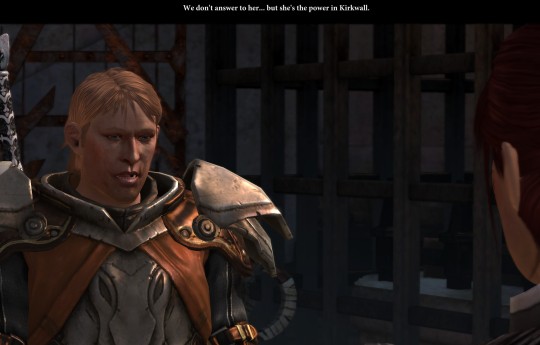


Guardsman Wright: So Knight-Commander Meredith wants us to sort you all out. Most of you are getting right back on your ships, though.
Hawke: That's a templar title. Why would a city guardsman answer to the templars?
Wright: We don't answer to her... but she's the power in Kirkwall. Don't know what would happen if the viscount went against something she wanted... But he's sure never taken that chance.
Likewise, if asked about “the word on the street,” Corff the bartender remarks as early as Act 1, “People say Meredith's the real power in Kirkwall, not the Viscount. Even Dumar answers to her.”
Ordinary citizens appear terrified of Meredith, and with good reason. During the quest Enemies Among Us (Act 1, set in 9:31 Dragon), we get the following exchange with the sister of a Templar recruit:
Macha: I pleaded with him not to join the Order, but he wouldn't listen. You hear dark rumors about the templars and Knight-Commander Meredith. And now my brother is gone.
Hawke: (“Are templars so bad here?”) In Lothering, some templars died protecting villagers. I never heard any dark rumors.
Macha: And those are the stories my Keran adored. But it is not like that here, serah. There is a growing darkness in the order. They prowl the streets in packs. Hunting. And now, they say their duties put them above us, that they have the right to... take people from their homes. It is frightening.
Hawke: (“Tell me about Meredith”) What do people say about Knight-Commander Meredith?
Macha: Oh, she has many admirers. They laud the service she does in keeping the mages in check. But others say she is terribly fierce and utterly without pity. That she sees demons everywhere. It is dangerous even to whisper such things. People harboring escaped mages just disappear. Templars interrogate and threaten passers-by. My friend has a cousin who’s a mage, and she says he was made Tranquil against his will. You hear more with each passing day.
Of course, Knight-Commander Meredith’s reign over the Gallows was notoriously brutal long before she came into contact with Red Lyrium. Writing 3 years after the coup (but 7 years before Act 1), in 9:24 Dragon, Brother Genitivi remarks that "Kirkwall has been a tinderbox since becoming the center of templar power in eastern Thedas." As early as Act 1, mages in the Gallows can be heard crying out, “This place is a prison,” and “Knight-Commander Meredith would kill us all if she could.” When asked if mages are imprisoned, the guardsman replies, “Used to be, back in the Imperial days. They kept slaves here until the rebellion. Now the templars run it and use it to lock up their mages. Guess not much has changed” (The Destruction of Lothering, Act 1). Karl Thekla’s final letter before being turned Tranquil (with such illegal uses of the Rite having been repeatedly reported to Meredith) “said the knight-commander was turning the Circle into a prison. Mages are locked in their cells, refused appearances at court, made Tranquil for the slightest crimes” (Tranquility, Act 1). If Hawke questions the truth of these accusations, Anders responds, “Ask any mage in Kirkwall. Over a dozen were made Tranquil just this year. The more people you ask, the worse the rumors become.” (Elthina also appears to be aware at least to some extent of the subsequent ambush, in which a Tranquil Karl was used as bait to ensnare his former lover).
According to the short story Paper & Steel (focusing on Samson): “Under Meredith, freedom was a cruel dream for Kirkwall’s Circle mages. They were often locked in their cells, watched night and day by templars who were told any step out of line was suspicious. All those young magelings, told that magic was a curse, that they were dangerous, and that they had to be shut indoors all their lives looking out through those windows. Some went mad. Others, mad or not, tried jumping.” And from First Enchanter Orsino’s entry in World of Thedas, vol. 2 (p. 195): “Every time a mage died by their own hand, Orsino would hear Maud’s final words to him: 'This is no life.�� The templars didn’t seem to care about the suicides. Most had the courtesy to say nothing at all, but some would snigger when they thought no one was listening. 'One less to worry about.’ ‘The only good mage is a dead mage.’ Orsino’s anger at the templars grew...” (Note that this began long before Orsino became first enchanter in 9:28, three years before the start of the game). It's also worth noting Knight-Captain Cullen Rutherford quite explicitly attained his position as second-in-command of the Kirkwall Templars position because of his anti-mage extremism, later including violence against those perceived as mage sympathizers and their families.
To name more specific abuses, the Gallows features whipping posts (with dialogue confirming the reliance on whipping) and multiple other medieval torture devices, including a rack, a pillory, and iron maidens. We also see numerous references to casual beatings, sexual assaults, forced Tranquility and facial branding, long-term confinement in dark cells, and permanent family separation (e.g., Emile du Launcet). Escape attempts are typically punished with summary execution, according to multiple sources (e.g., Ser Thrask, Ser Karras, Grace). According to Ser Thrask, the most sympathetic Templar (besides Carver), kindness to mages would be a "badge of shame" among among his colleagues. For more, I recommend checking out the “DA2 mage rights reference post” by @bubonickitten. Again, note that these are cruelties largely occurring prior to or during Act 1, long before Meredith started going insane due to Red Lyrium.
If Feynriel is forced into the Circle at the end of Wayward Son (Act 1), the ex-Templar Samson says, “I hear they got your boy Feynriel locked up in the Circle. Bad business, that. It ain't all templars that're bad. It's hard luck being born a robe, but most places, they make it work. That bitch Meredith runs the Order in this town like her private army. You don't toe the line, you end up on the next corner here in Darktown. I don't think you got to hate mages to love the Order. But Meredith don't agree.” Samson, it should be remembered, had been expelled from the Templar Order for passing love notes from the mage Maddox to his lover. For the crime of “corrupting the moral integrity of a templar,” Meredith ordered Maddox turned Tranquil. According to Cullen in Before the Dawn (DAI), “Knight-Commander Meredith wielded the brand for far lesser offences, believe me."
Ordinary citizens appear to be well aware of at least some of Meredith’s reign of terror in the Gallows, given that various NPCs (including some who do not personally know any inmates) will refer to it. During Tranquility (Act 1), for example, a mob of Ferelden refugees threatens the party over fears that the latter intend to turn in “The Healer of Darktown” to the Templars. One exclaims, "We know what happens to mages in this town. And it ain’t gonna happen to him." Moreover, the knowledge is sufficiently widespread as to have reached faraway countries. A note dated 9:35 (set between Acts 2-3) from a mage of the Hossberg Circle in the Anderfels expresses utter horror: “I have heard that in the Kirkwall Gallows, mages are locked in their cells with barely room to stretch, let alone exercise. I can promise you that any mage of the Anderfels would be stark raving mad after a week of such treatment... No wonder Kirkwall has such trouble with blood mages” (WoT v2, p. 173).
And through all of this, Meredith has the support of the Chantry and more specifically Grand Cleric Elthina.
Not only did Elthina appoint Meredith to her position in the first place (WoT v2, p. 193), but if asked her opinion on Meredith in Act 1, Elthina snaps, “Gossip is a sin, child. Knight-Commander Meredith has an admirable devotion to her duties. It is not my role to form opinions on her character.” An odd statement to make about a subordinate, since Meredith reports to her directly (as knight-commanders legally do to the nearest grand cleric). The codex for Knight-Commander Meredith confirms at as of the end of Act 2, “she enjoys the grand cleric's full support and has free rein in Kirkwall as the commander of its most powerful military force.” According to Elthina’s codex, many claim that Elthina “allows Knight-Commander Meredith more leeway with each passing year.” According to World of Thedas vol. 2, which tries to put a more positive spin on Elthina’s role, her detractors “say her stubborn refusal to exercise her Chantry-given authority allowed the conflict between the templars and mages to escalate, finally resulting in the disastrous mage rebellion of 9:37 Dragon... Since Elthina was loath to exploit her authority as grand cleric, she refused to order either the mages or templars to stand down when tensions flared. Many believe that she could have forced one side to retreat by showing her support for their position, but Elthina refused to take sides” (p. 196-197). This is at best an abdication of responsibility to dependents for someone intent on remaining in power.
Moreover, Elthina’s dominance over Kirkwall appears to depend in large part on at least appearing to manage Meredith and her troops. According to her codex, “People frequently turn to her to mediate disputes—particularly those involving the powerful Templar Order, over whom she holds authority as the Chantry's ranking representative.” So Meredith as military leader rules both the Circle and the city-state through fear and violence, while Elthina maintains her power by playing Good Cop to Meredith's Bad Cop. Both then maintain a pretense of legality and legitimacy by fronting Viscount Dumar as the public face of the regime.
And this dual-power system works quite well for them -- at least until Meredith starts losing her mind under the influence of the Red Lyrium idol.
[A link will later be provided for Part 2 on Escalation and Direct Rule. If I ever do get to it 😭😭😭]
#dragon age 2#dragon age#dragon age lore#dragon age meta#da meta#chantry critical#anti chantry#anti orlais#templar critical#anti templar#da2#knight commander meredith#meredith stannard#kirkwall#kirkwall gallows#grand cleric elthina#elthina critical#Cullen critical#viscount marlowe dumar#orlais#free marches#orlais critical
735 notes
·
View notes
Text
Binance Exclusive: Start Trading with $100 for Free!

Take your first steps into the exciting realm of cryptocurrency trading with Binance! Sign up now and receive a complimentary $100 to kickstart your trading journey. Explore a diverse selection of cryptocurrencies, hone your trading skills, and potentially turn that initial $100 into something more. Don't miss this exclusive offer – seize the opportunity to trade on Binance with free funds! #binance #cryptotrading #freemoney Link Below : https://bit.ly/BinanceFree100
#Cryptocurrency#Forex#Stocks#Day Trading#Swing Trading#Technical Analysis#Fundamental Analysis#Trading Strategies#Risk Management#Options Trading#Futures Trading#Bull Market#Bear Market#Market Trends#Stop-Loss#Take Profit#Margin Trading#Leverage#Candlestick Patterns#Market Volatility
0 notes
Note
Hi! I had some questions about your guideverse AU after reading one of your fics. I’ll admit most of it is just because I’m unfamiliar with the concept of a “guideverse” AU.
How does the guiding work? How do the bonds actually work? The idea of being able to force one ruined any understanding I could piece together. One of your fics mentioned the reader being a battle-type esper, so there must be something like support-type espers too? How is that classification determined? I assume it has to do with the type of powers manifested. Also, I noticed there’s a pattern of calling espers dramatic. Is this just a plot thing, or do the powers make them more emotionally unstable?
Sorry for the wall of questions.
omg guideverse questions yippee (don't be sorry i get really excited when i see questions about guideverse!!!)
these are not answers for every guideverse, this is just how things work in mine specifically!
How does guiding work?
When a Guide touches an Esper—always skin-to-skin—it acts as a conduit that opens a psychic link. This link allows the Guide to "hear" or "feel" the Esper’s emotional and neural frequencies.
Once contact is made, the Guide consciously pushes their own stable frequency toward the Esper’s. Think of it like tuning two instruments to the same pitch.
How do these bonds work?
So there are 2 types of bonds: Temporary and Permanent. They're both used for making the guiding process more efficient.
Temporary Bonds:
A temporary bond is a flexible, short-term connection between a Guide and an Esper. Its usually initiated when there's a large rank difference between Esper and Guide to make sure that the Esper can feel the exertion and stop when the Guide is getting dangerously drained.
Permanent Bond:
A permanent bond is a rare, lifelong psychic connection formed when a Guide and an Esper resonate at a near-perfect frequency and both willingly consent to solidify the link. The guiding is more efficient when the pair is permanently bonded.
Consequences of a permanent bond:
For the Guide:
They become unable to guide anyone else.
For the Esper:
They can no longer be effectively guided by anyone else.
Others may try, but the effects will be weakened, often feeling hollow or even physically uncomfortable.
Forced Bonding?
A forced bond occurs when an Esper deliberately overwhelms or hijacks a Guide's resonance without consent, attempting to lock a bond against the Guide’s will.
These are extremely rare and universally condemned—both ethically and legally.
Consequences:
For the Guide:
Suffers psychic trauma—the equivalent of being set on fire from the inside.
Experiences a sharp, often permanent loss in guiding efficiency.
For the Esper:
The bond does not become permanent, no matter how hard they push. It eventually collapses under its own instability.
Most Espers who attempt this do so out of desperation, not malice—but it’s still treated as a serious offense.
Types of Espers?
There are Battle Types and Support Types. They're classified according to the abilities that they get.
Battle Type Espers:
Primary Role:
Offense, combat engagement, and direct suppression of Gate-born entities.
Abilities:
High-output, volatile, or destructive in nature.
Manifest as elemental control, psychic force projection, weaponization of thought, or raw energy manipulation.
Prone to power surges and emotional bleed-through during high-stress combat, making them heavily reliant on stable guiding.
Support Type Espers: (Very rare)
Primary Role:
Defense, utility, stabilization, and team augmentation.
Abilities:
Subtle but essential—often involve shielding, spatial control, time perception slowing, healing, detection.
Designed to regulate or manipulate the Gate environment itself, rather than destroy what's inside it.
Still emotionally reactive, but generally more stable than Battle-types.
Are espers dramatic or is it a side effect?
Almost all Espers are emotionally unstable.
Emotional instability isn’t a flaw in Espers—it’s practically a feature of the job. The very nature of being an Esper means existing with your psyche wide open, constantly flooded with noise, power, and pressure. Even the strongest ones—the SSS-Ranks who clear Gates single-handedly—aren’t immune. In fact, the more powerful an Esper is, the louder the chaos gets.
1. Noise
This “psychic noise” never really turns off. Sleep doesn’t mute it. Solitude just sharpens it.
Guides help quiet it, but outside of those sessions? It’s like trying to meditate during a rock concert.
2. Guilt
Espers are the first into Gates and the last out.
They’re trained to fight, save, contain—and failures stick. Hard.
Many Espers carry survivor’s guilt or a martyr complex. They can’t save everyone, and that gnaws at them.
Hope this cleared up some things!!
167 notes
·
View notes
Text
Short Astro Observations 🌌💫🧊
1. When Rahu-Ketu transits hit the same or opposite signs of your D9 Rahu-Ketu axis, expect fated shifts in your love life 👀💋. These can trigger soulmate/future spouse meetings or karmic reconnections.
2. Moon-Rahu conjunction in synastry can indicate heightened fertility 🤰 and a strong emotional-psychic bond 🥺. Rahu expands what it touches, and when it's the Moon (symbol of the mother), it can amplify nurturing instincts, reproductive urges😳 and even lead to "fated parents" vibes. This aspect often feels destined ✨, like you were meant to create something together.
3. Mars square Uranus individuals (tropical chart) can be restless, impulsive, defiant, and wildly unpredictable🔥⚡. They can be magnetic/unique, but emotionally volatile- prone to anger outbursts🧨 or detachment periods🍃. Relationships with them can feel like a rollercoaster 🎢, you never know what to expect.
4. If you're curious whether a man is ready to commit🔒 or get married💍, check his Saturn in the D9 (Navamsa) chart 🪐. Saturn shows maturity and karmic responsibility⏳. Now look at the transits of Saturn (especially), Jupiter, and Rahu to that Saturn.
But here’s a warning: if Ketu transits over his D9 Saturn (and he doesn’t already have that combo or Ketu energy natally), it can trigger emotional detachment, disillusionment, or even a breakup/divorce 🥲💔.
Note: This post is based on general patterns and observations. The way a placement plays out can really depend on the sign, house, aspects and overall condition of the chart. Every chart has its own story, so always take what resonates and look at the bigger picture.
P.S. Enjoyed this post? Reblog and drop a comment below! Let me know what kind of astrology games and insights you'd love to see more of!
inspired by @musexmessenger (TikTok)
#vedic astrology#future spouse astrology#future spouse#western astrology#timing of meeting future spouse#saturn#d9 chart#ketu synastry#mars square uranus#uranus#moon-rahu synastry#rahu synastry#astrology compatibility#astro notes#astro community#astroinsights#astro observations#astro tumblr#tropical astrology#synastry observations#astroblr#astro hacks#babymaking aspects
173 notes
·
View notes